Apollo Neuro is the first wearable device that uses low-frequency inaudible sound waves (gentle vibrations) to help reduce stress levels and blood pressure, speed up recovery, and positively influence your autonomic nervous system by changing your heart rate variability (HRV).
I started using Apollo in July 2020 and have logged more than 18180 minutes (300 hours) with the device. Over that extensive testing period, I’ve found it to be a highly effective tool for managing stress and improving sleep quality.
In this Apollo review, I’ll explain how the device works, outline the surprisingly large amount of research that supports its use, and detail exactly how I’ve integrated it into my own health and wellness regimen.
Apollo Neuro Review
Pros:
- Clinically validated to improve HRV, energy and sleep.
- Comfortable to use.
- Provides effective stress relief within minutes.
- Non-intrusive.
Cons:
- Battery life.
- Lack of integration with other platforms (e.g., WHOOP).
- Price.
The purpose of the Apollo Neuro wearable is to help you manage stress, improve your energy levels, stay calm and focused, sleep better, and recover faster from both sickness and strenuous physical activity.
What you may not know is that your nervous system is one of the major factors in controlling all of the above. That’s why Apollo uses scientifically-validated vibration patterns that can up-regulate or down-regulate your sympathetic or parasympathetic nervous system, depending on the benefits you’re trying to achieve (i.e., to relax and unwind or to be more energetic).
Note that the sympathetic nervous system is responsible for the fight-or-flight response and the parasympathetic branch controls your rest-and-digest and feed-and-breed behaviors.
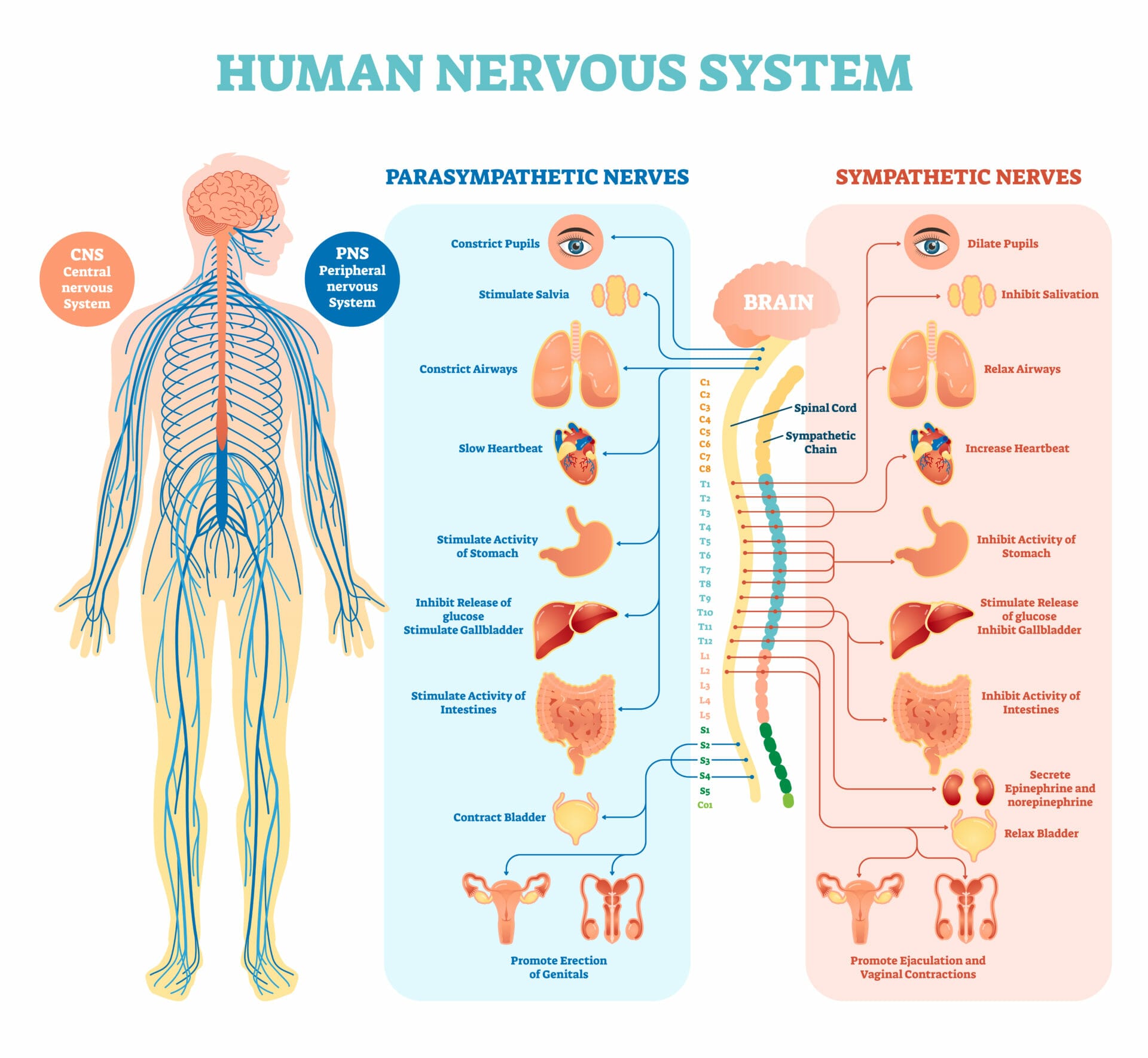
What Is HRV and Why Does It Matter?
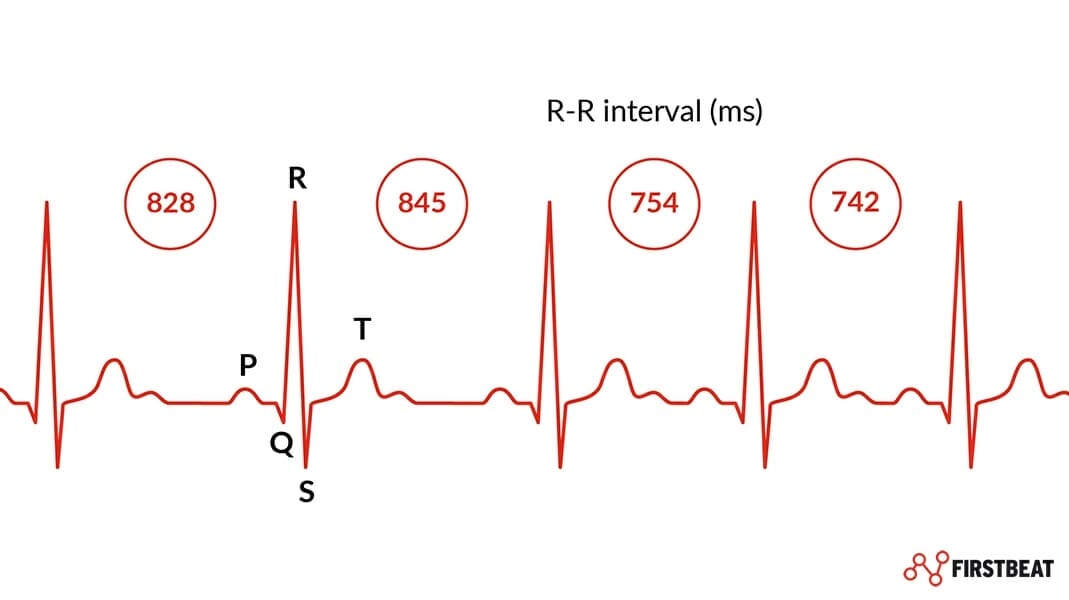
Heart rate variability (HRV) — which is the difference in time between heartbeats — is a key metric of health and an indirect indication of how your nervous system is performing. Specifically, HRV can tell you if one branch of your nervous system is in overdrive.
For example, a low HRV is usually an indication that the sympathetic branch of your nervous system — the one that triggers the fight-or-flight response — has taken over.
While a low HRV is normal when you’re sick or after a tough workout, a consistently low HRV can signal an underlying problem.
Some of the most common causes of a consistently low HRV include:
- Chronic stress (if not properly managed).
- Low-quality or insufficient sleep.
- Disease or sickness.
- Dehydration.
- Other lifestyle factors, such as an unhealthy diet.
The problem with a consistently low HRV is that it can dramatically increase your risk of injuries, cardiovascular illness, anxiety-related disorders and depression, and can lead to insomnia and chronic pain.
On the flip side, a high HRV is an indication that your body is more resilient and can quickly bounce back from emotional and physical stress.
So the purpose of Apollo is to help you better manage stress, increase your focus, improve your sleep and support physical recovery, leading to an overall increase in HRV.
How Does the Apollo Wearable Work?
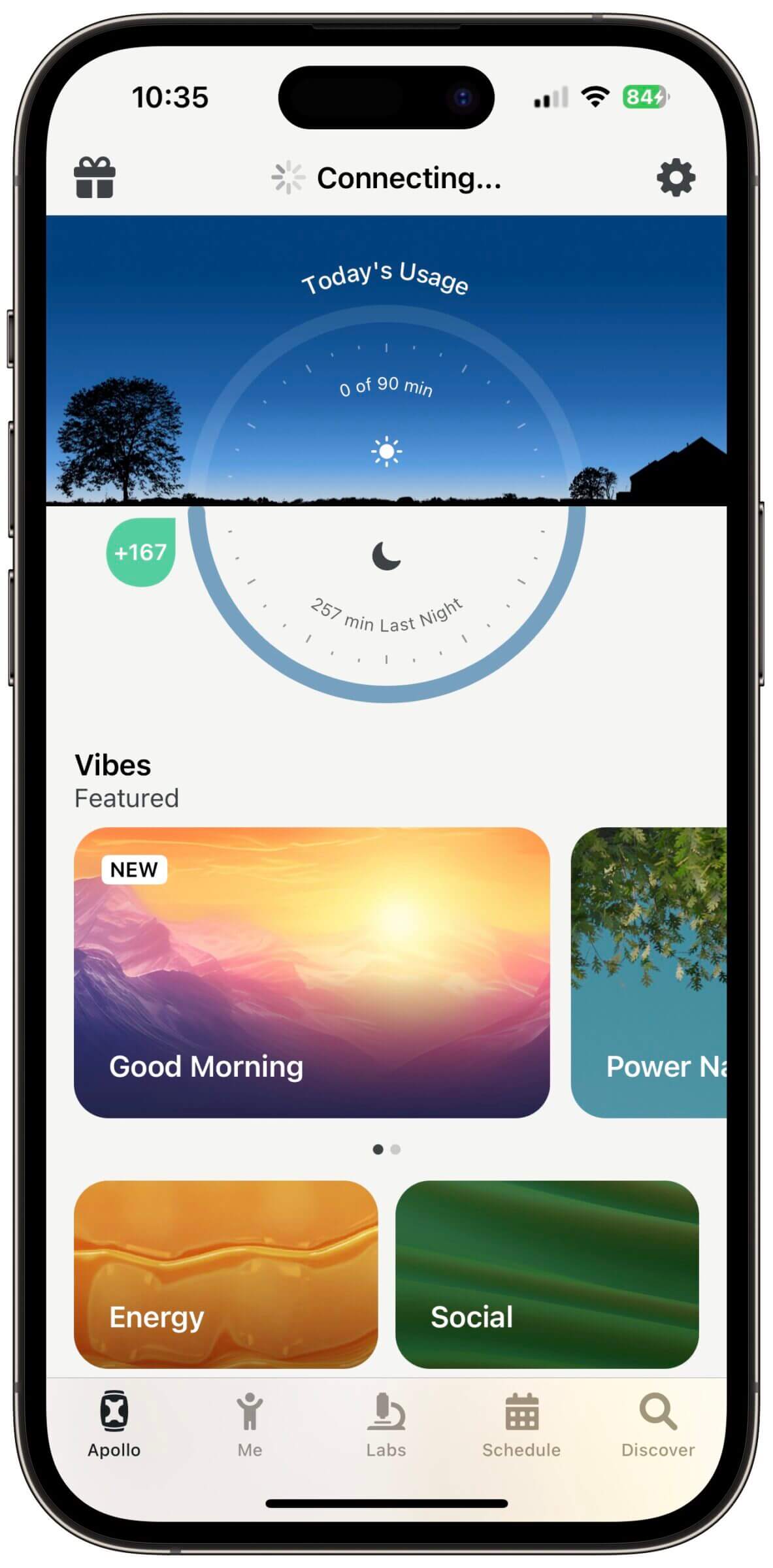
The Apollo Neuro wearable device creates gentle, inaudible sound waves that you can feel on your skin, leveraging a treatment known as touch therapy.
The basic principle is that those inaudible sound waves can change how you feel by stimulating your sense of touch.
More specifically, certain frequencies and vibrations can increase the parasympathetic tone (a measurement of activity), while others can increase your heart rate and activate other parameters of sympathetic activity.
So the research team behind Apollo has designed various vibration modes (called Apollo Vibes) that can influence your nervous system in specific ways to target a range of benefits.
As of this writing, there are nine distinct vibes available:
- Good Morning: Transitions you from sleep to daytime so you feel more energized, focused and awake.
- Power Nap: Eases you into a short rest and gradually wakes you up to restore energy and reduce fatigue.
- Energy: If you’re in a boring meeting or feel like you need a cup of coffee, you can use this mode to feel more energetic.
- Social: Perfect for meetings, get-togethers, networking events, parties or date nights.
- Focus: Use this mode before athletic competitions, during presentations, or to improve your productivity.
- Recover: Perfect for after you experience mental and/or physical stress, or when you feel run down or sick. You can also use it while traveling or when suffering from jetlag.
- Calm: To get into your flow state, or when you’re feeling tense or in need of meditation.
- Unwind: Unwind before bedtime, relax while traveling, or to calm down after intense stress.
- Fall Sleep: Use before and during sleep, to fall (back) asleep quicker, and to reduce the occurrence of bad dreams.
Stay Asleep
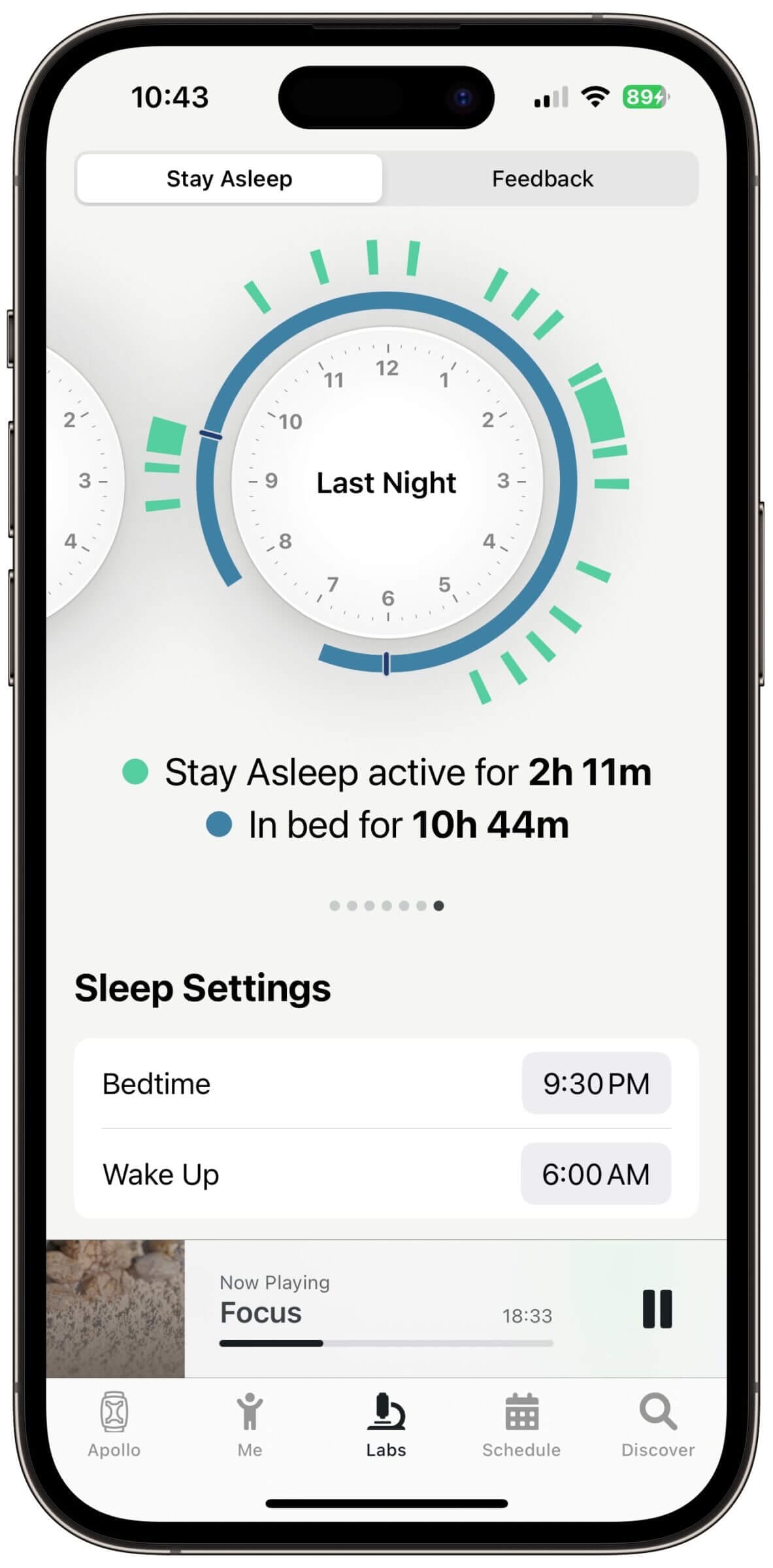
In addition to the Vibes, Apollo offers a special Stay Asleep mode via an optional subscription (called Apollo Labs). With Stay Asleep, Apollo monitors your movements while you sleep using its built-in accelerometer to detect if you’re waking up in the middle of the night. When that happens, Apollo automatically enables a sleep Vibe to help you fall back asleep quicker.
I’ve been using Stay Asleep for the past few weeks and I was surprised how often Apollo kicked in. I don’t remember most of those awakenings but I noticed how much more refreshed I wake up on days I used Stay Asleep. I’ve also noticed how much quicker I bounce back from intense workouts if I use Apollo at night.
What Is the Scientific Evidence Behind the Apollo Wearable?
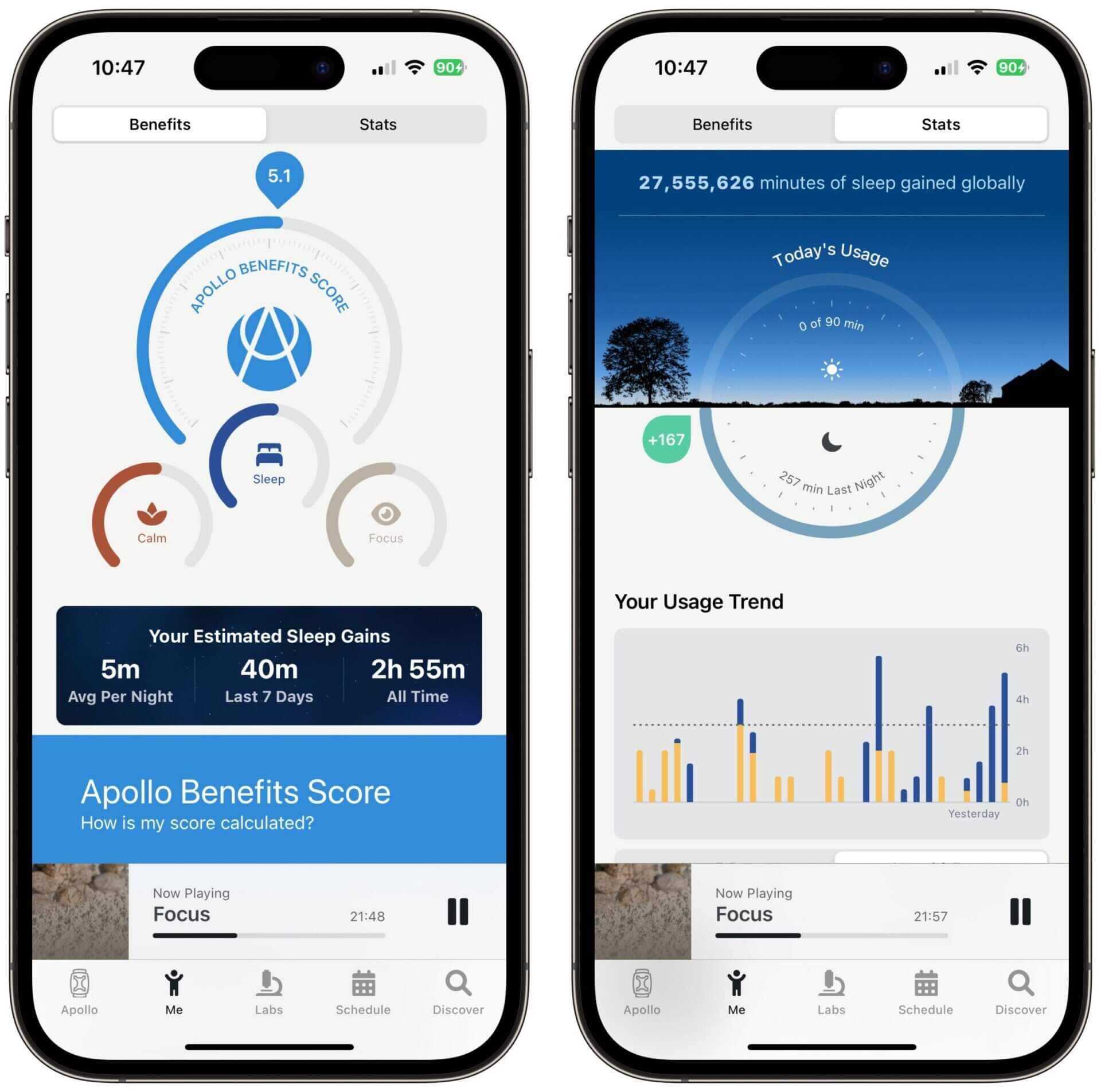
There is a surprisingly large body of research behind the underlying technology of Apollo, as well as the device itself. I encourage you to check out the science section on apolloneuro.com and my own article on the research behind Apollo if you’d like to take a deep dive.
In a nutshell, the science behind Apollo appears to be sound, as demonstrated by multiple studies.
- A recently published and peer-reviewed double-blind randomized placebo-controlled crossover trial conducted by the University of Pittsburgh showed that the Apollo wearable can help athletes recover faster after a strenuous activity, as measured by HRV.
- A double-blind randomized placebo-controlled crossover trial of 38 subjects with Apollo that was conducted by Dr. David Rabin and Dr. Greg Siegle (the co-founders of Apollo) at the University of Pittsburgh found that Apollo improved the focus, cognitive performance and HRV of the participants who used the device.
- A study of 40 college athletes conducted by the University of Minnesota found that Apollo improved the HRV of all 40 participants. Interestingly, the athletes who had the lowest baseline HRV numbers saw the most significant improvements.
- The preliminary results of a study conducted by Apollo show that users “experienced statistically significant improvements in deep sleep, REM sleep, total sleep, resting heart rate and heart rate variability (HRV).” Those who used the device for three hours per day, five times per week also saw improved sleep and cardio metrics.
Apollo also recently concluded a study involving patients that suffer from post-traumatic stress disorder (PTSD), and the results were encouraging.
15 out of 16 participants described the two week experience with the Apollo wearable as “life-changing” with respect to sleep, focus, and mood. All participants reported that Apollo vibrations were effective at helping them improve engagement in life activities by making it much easier to return from a ‘shut-down’ or dissociated state. Participants also reported that they noticed substantial improvements in mood, focus and sleep with the greatest improvements in their ability to regulate emotions.
Wearable Emotion Prosthetics for Post Traumatic Stress Disorder (EP-PTSD). https://clinicaltrials.gov/ct2/show/NCT03529981
The bottom line is that Apollo Neuro works, and the proof of its benefits can’t be attributed to a placebo effect, as they’ve been established through high-quality clinical trials.
Apollo Device and App
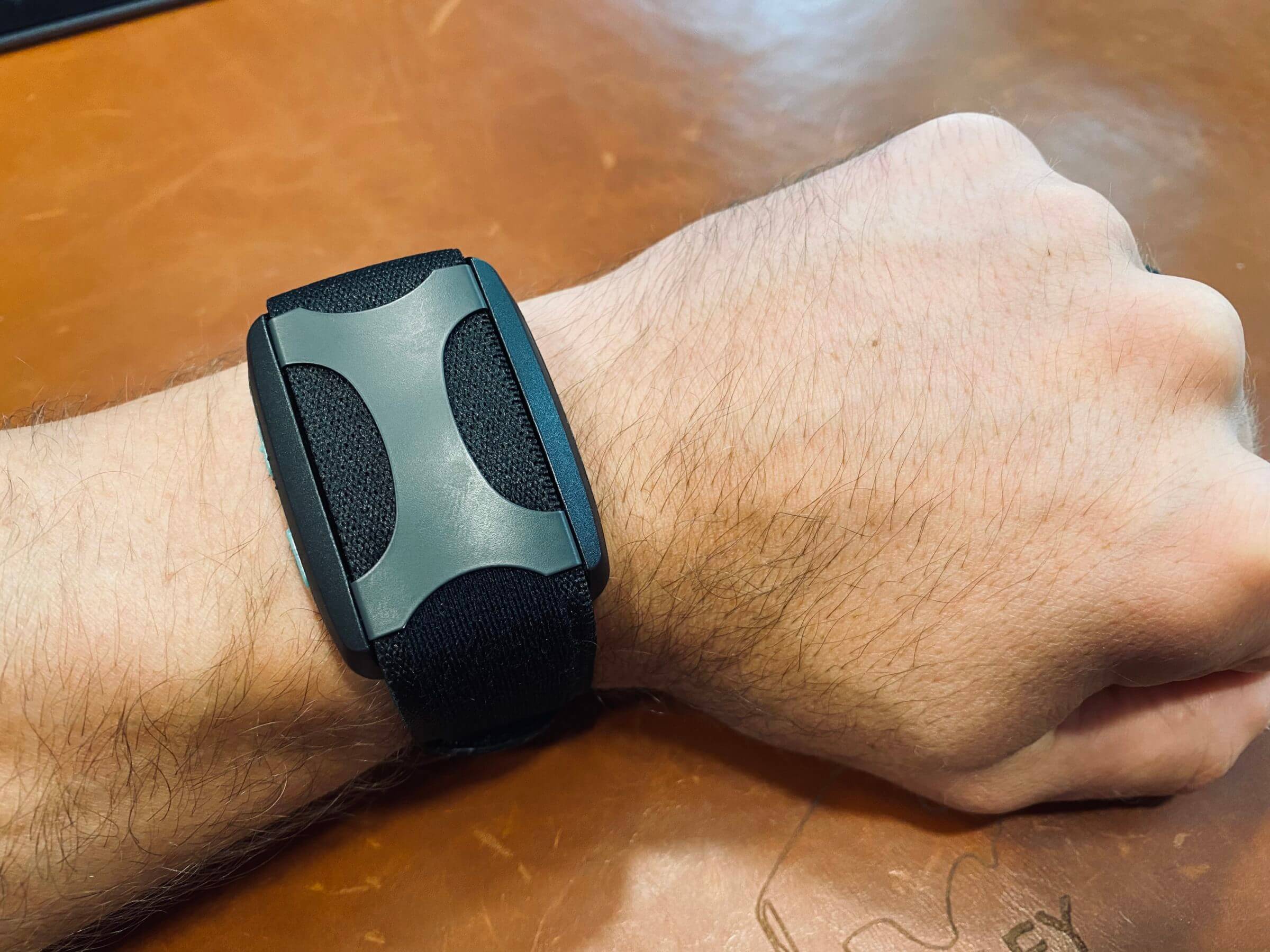
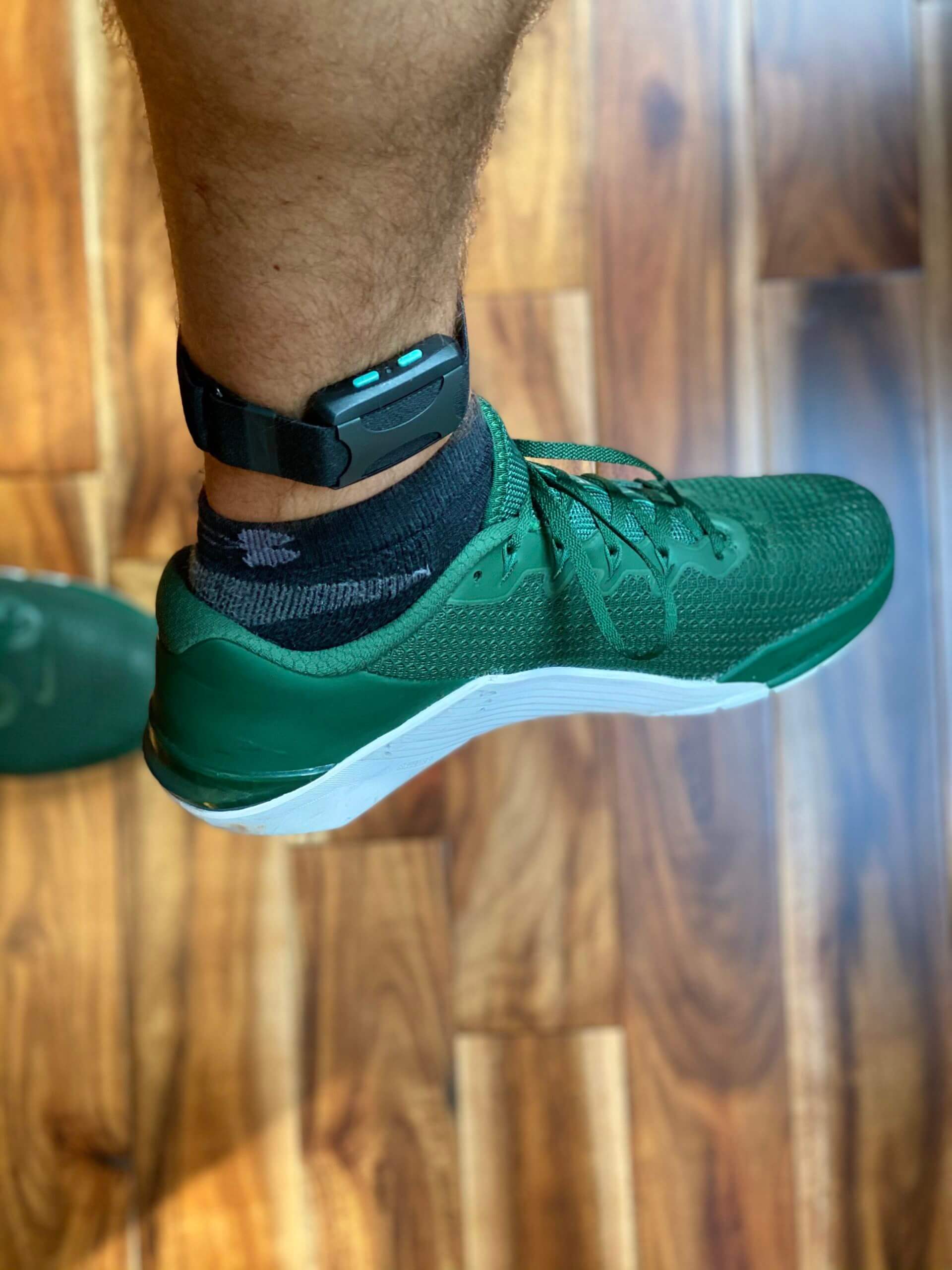
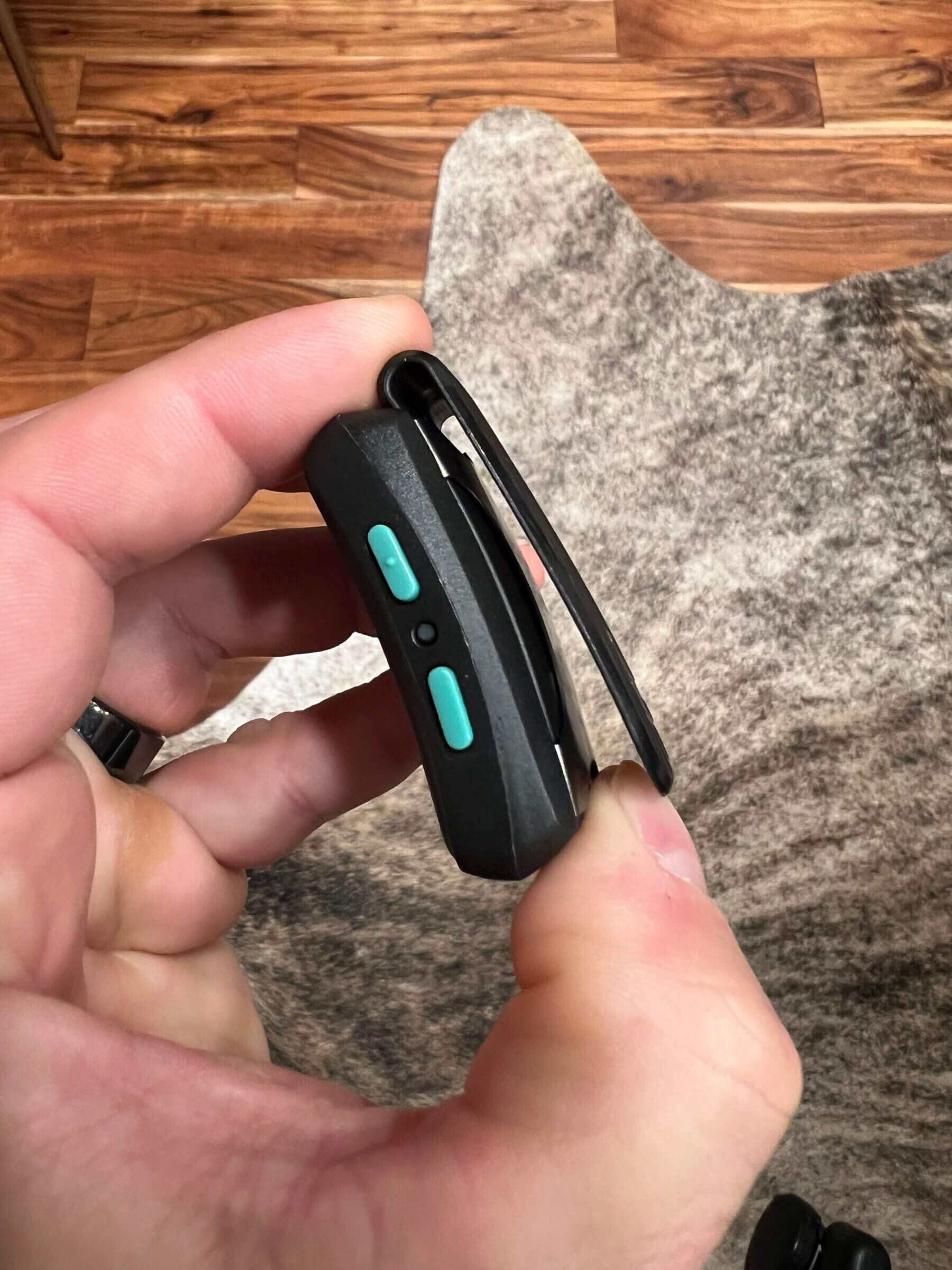
The Apollo Neuro experience consists of the hardware and a mobile app that’s available for both iOS and Android.
After I received my Apollo review unit, the first thing I had to do was pair the hardware with my iPhone. This step only took a few seconds and, once completed, I was ready to use the device.
The Apollo app is fairly simple to use, mostly because it only has a handful of features:
- Display the current battery level.
- Select a vibe.
- Discover vibes based on how you’re feeling and what you’re doing.
- Create schedules.
- Explore Labs (the optional subscription model).
- View usage metrics and account information.
Choosing a vibe is as simple as tapping one of the nine tiles and pressing the play button. You can also choose how long the program should run and your desired level of intensity (strength of vibration).
Apollo recommends starting with the pre-set intensity levels for each program. Once you get used to the vibrations, you can increase the intensity based on your preferences.
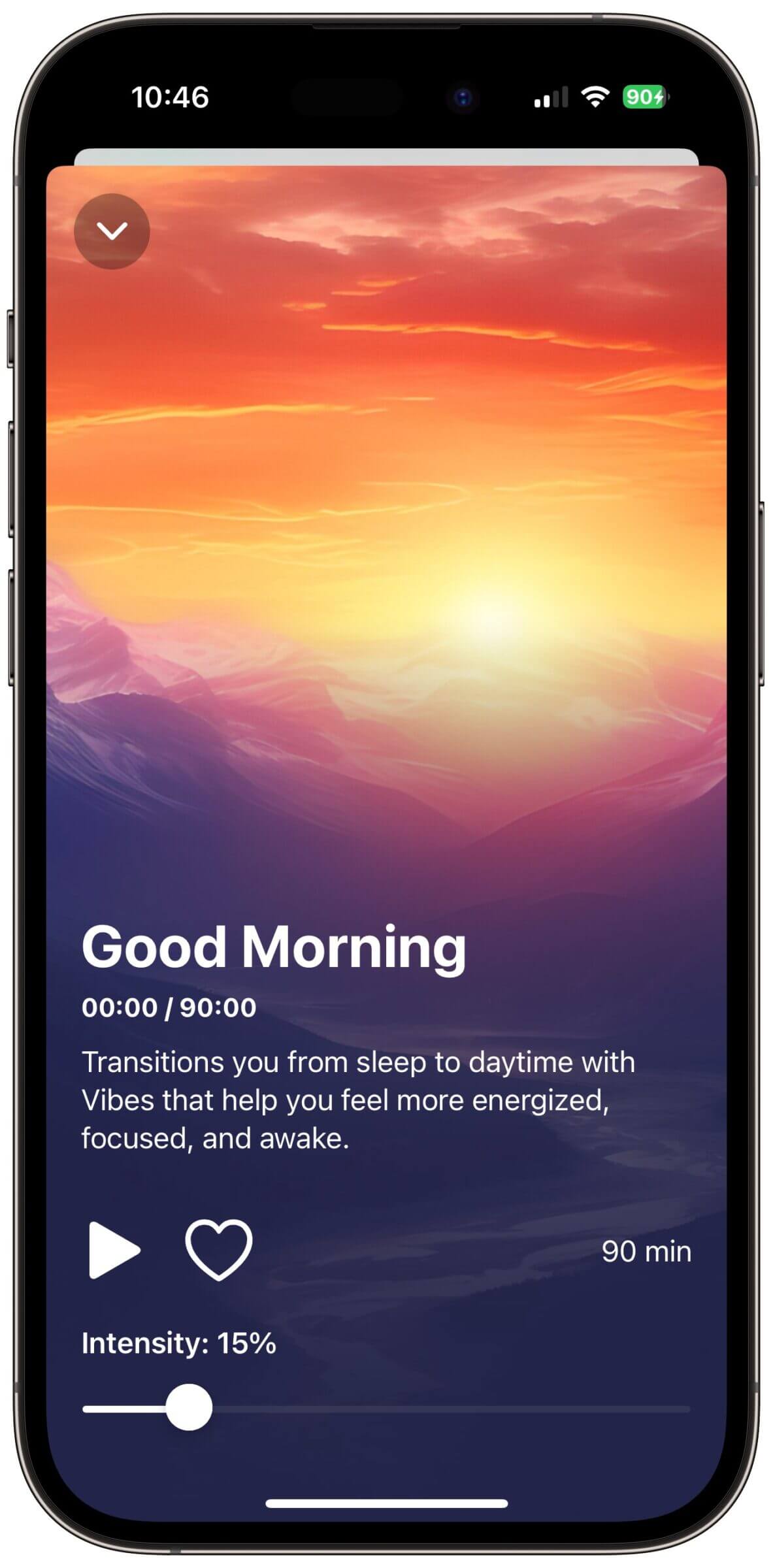
I followed that recommendation when starting out with the device. But over time, I increased the intensity of the different modes.
The app also offers you an option to mark some of the vibes and intensity settings as favorites, as indicated by a heart icon. While it might seem unnecessary to mark vibes as favorites (considering there are only nine vibes to choose from), you can mark certain vibe/intensity combination as favorites. In other words, you can create two favorites featuring the same vibe but at different intensities.
For example, that’s useful if you want to use a more intense variation of the Recover vibe after particularly strenuous workouts.
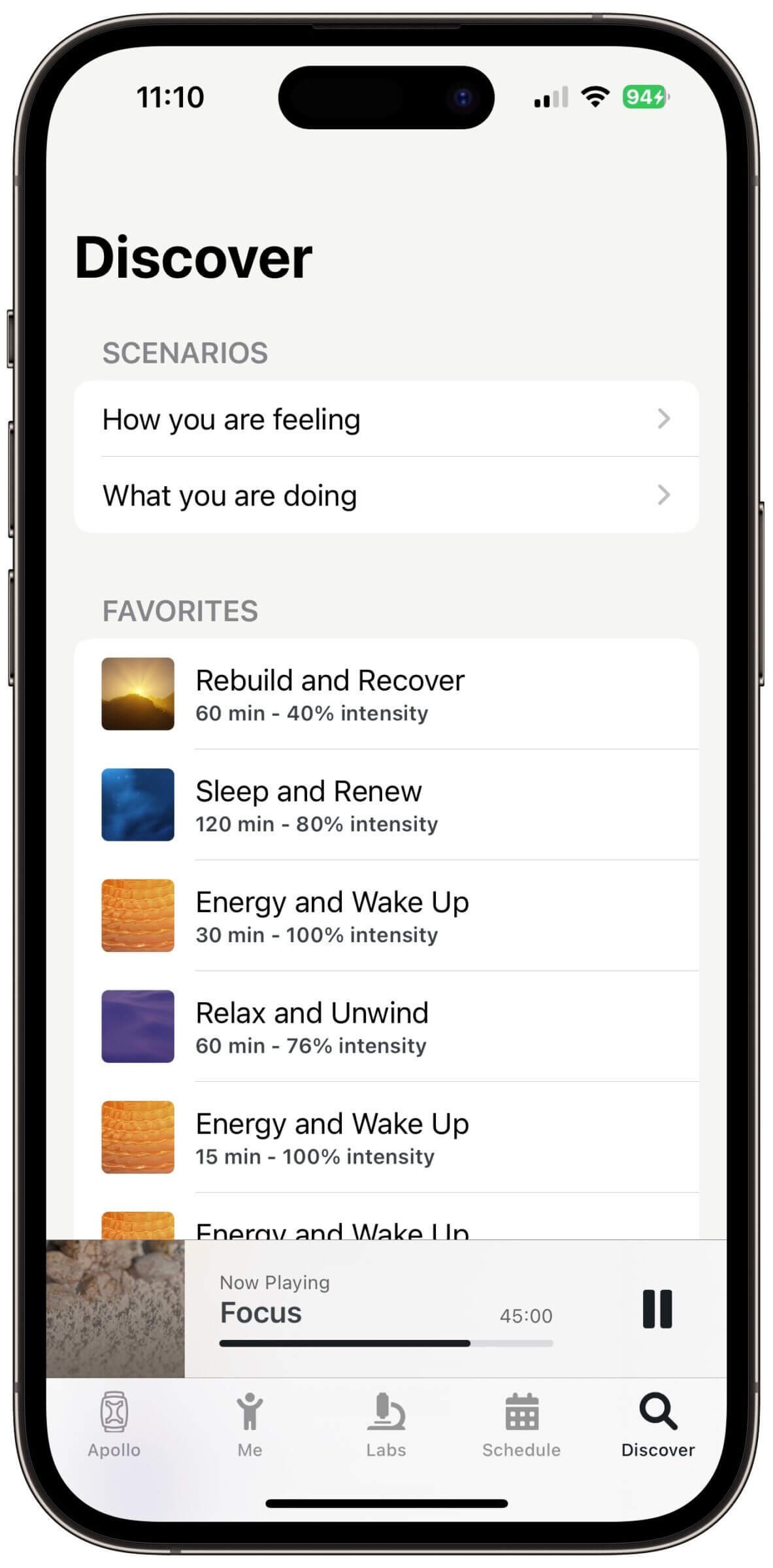
If you’re someone who doesn’t like being tethered to your phone, you’ll appreciate that the device has physical playback controls in the form of buttons that are located on the side. If you press both buttons simultaneously, you can start or stop playback of the most recently used program. You can also use the two buttons individually to increase or decrease the intensity in 5% increments.
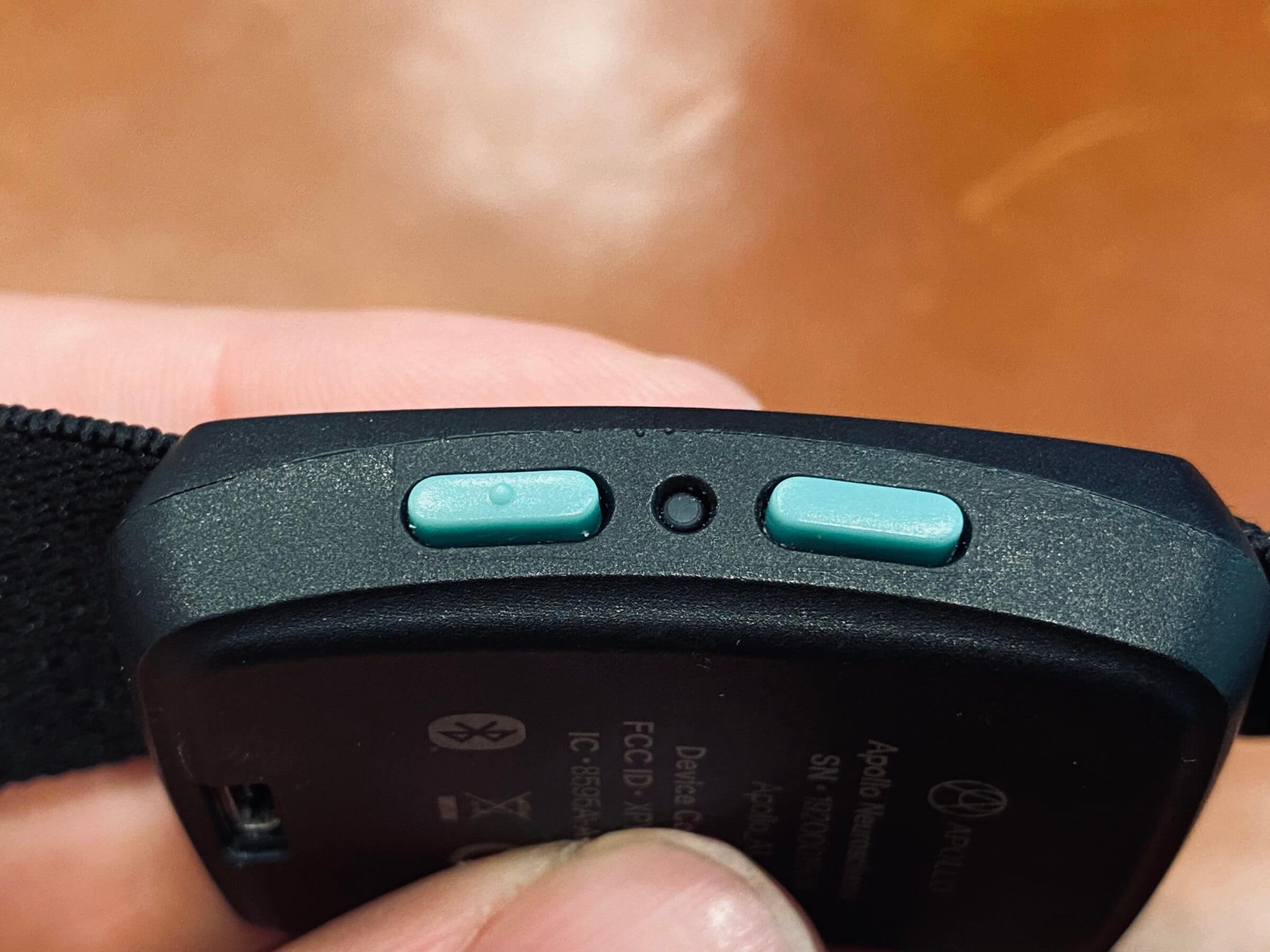
However, what you can’t do using the hardware buttons is select a new mode. Of course, that wouldn’t be practical anyway, as it’s nearly impossible to tell which program is currently running based on the vibration pattern.
Scheduling and Automated Playback
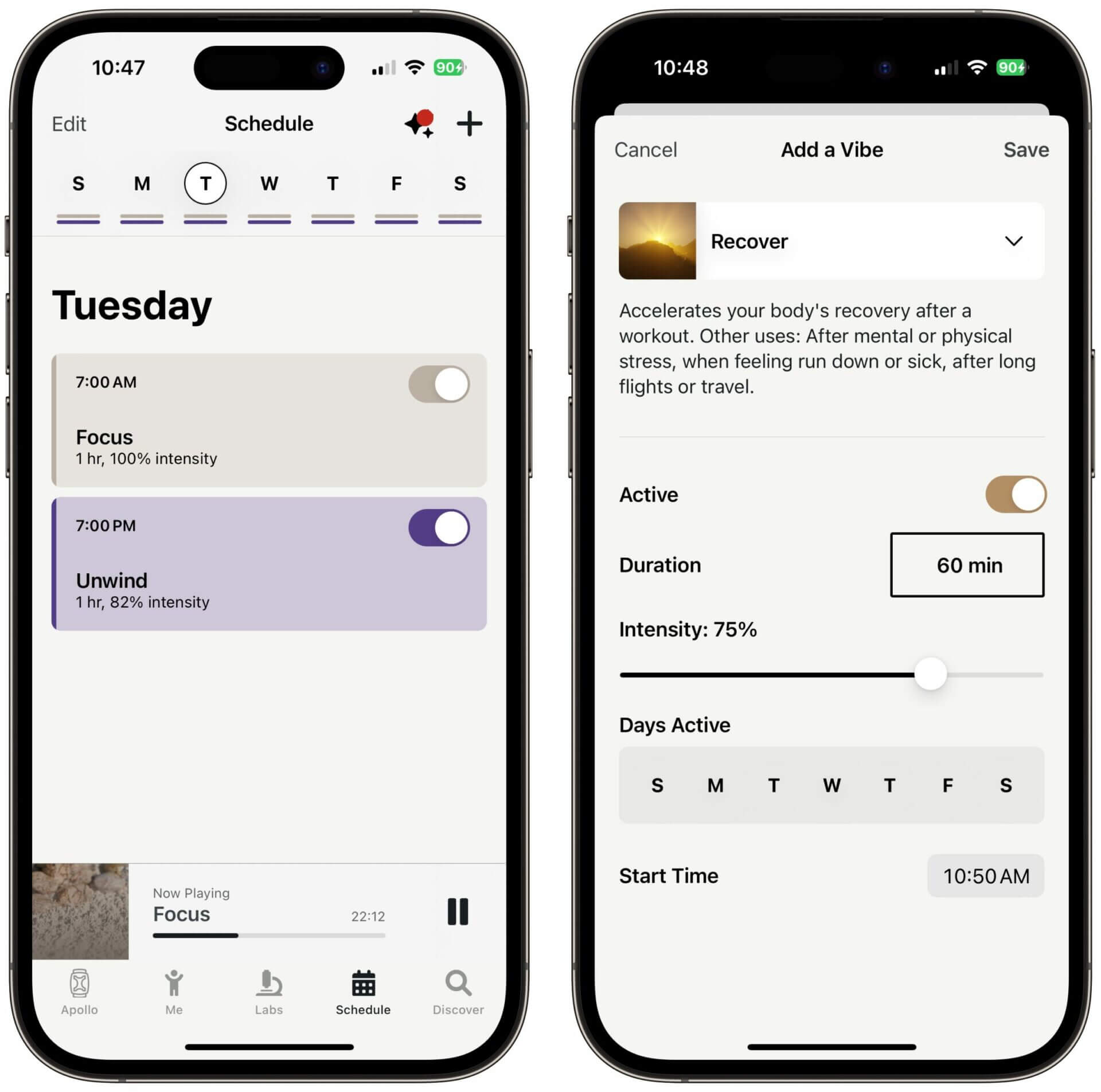
A relatively new feature in the Apollo app is the ability to create schedules that will turn on your desired Apollo program automatically. For example, I’ve created two schedules to automatically play the “Focus” program every day at 7 a.m. and the “Unwind” program at 7 p.m.
This means you can wear Apollo all day without having to worry about manually selecting and playing a program. Scheduling is the best way to use Apollo regularly and consistently.
Colors
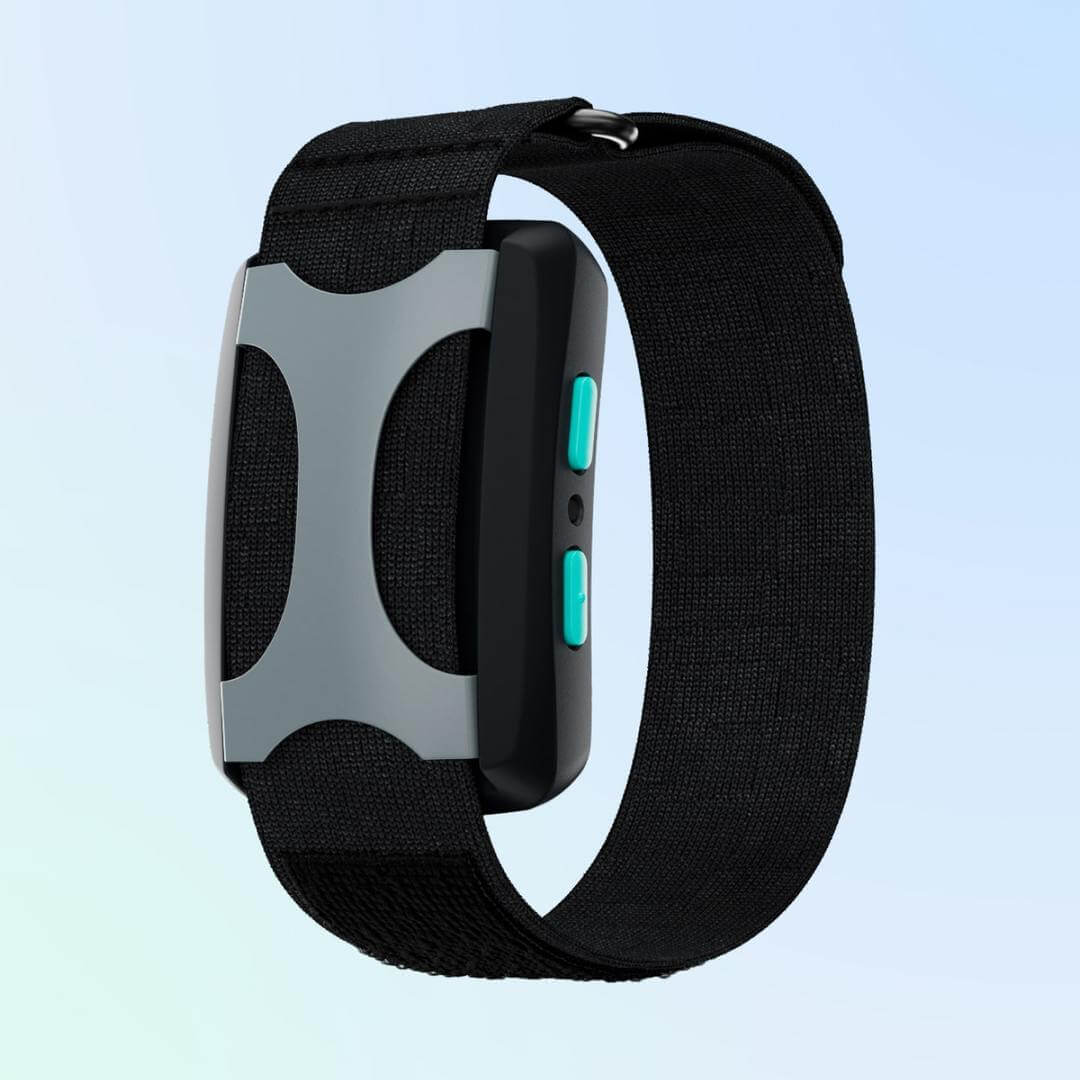
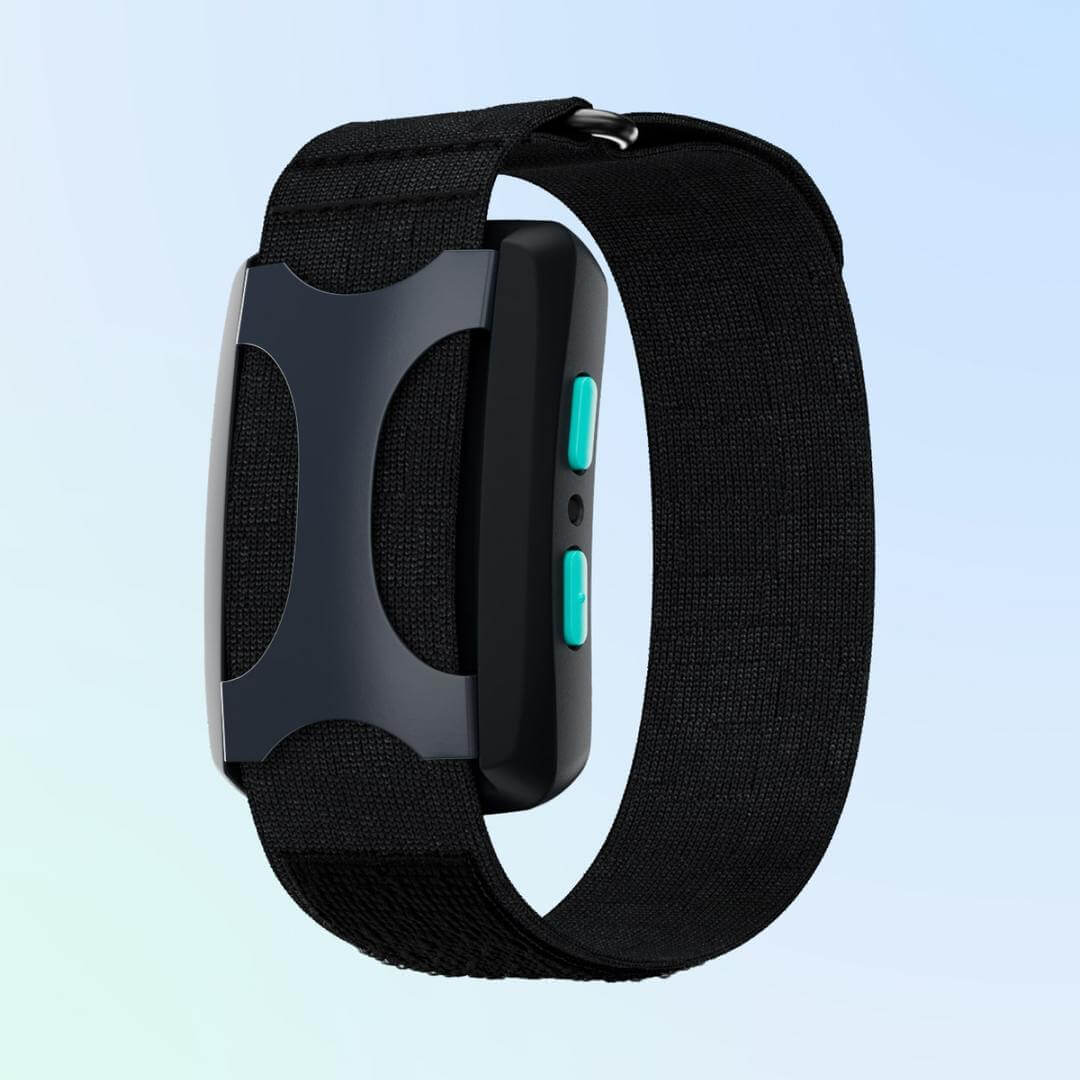
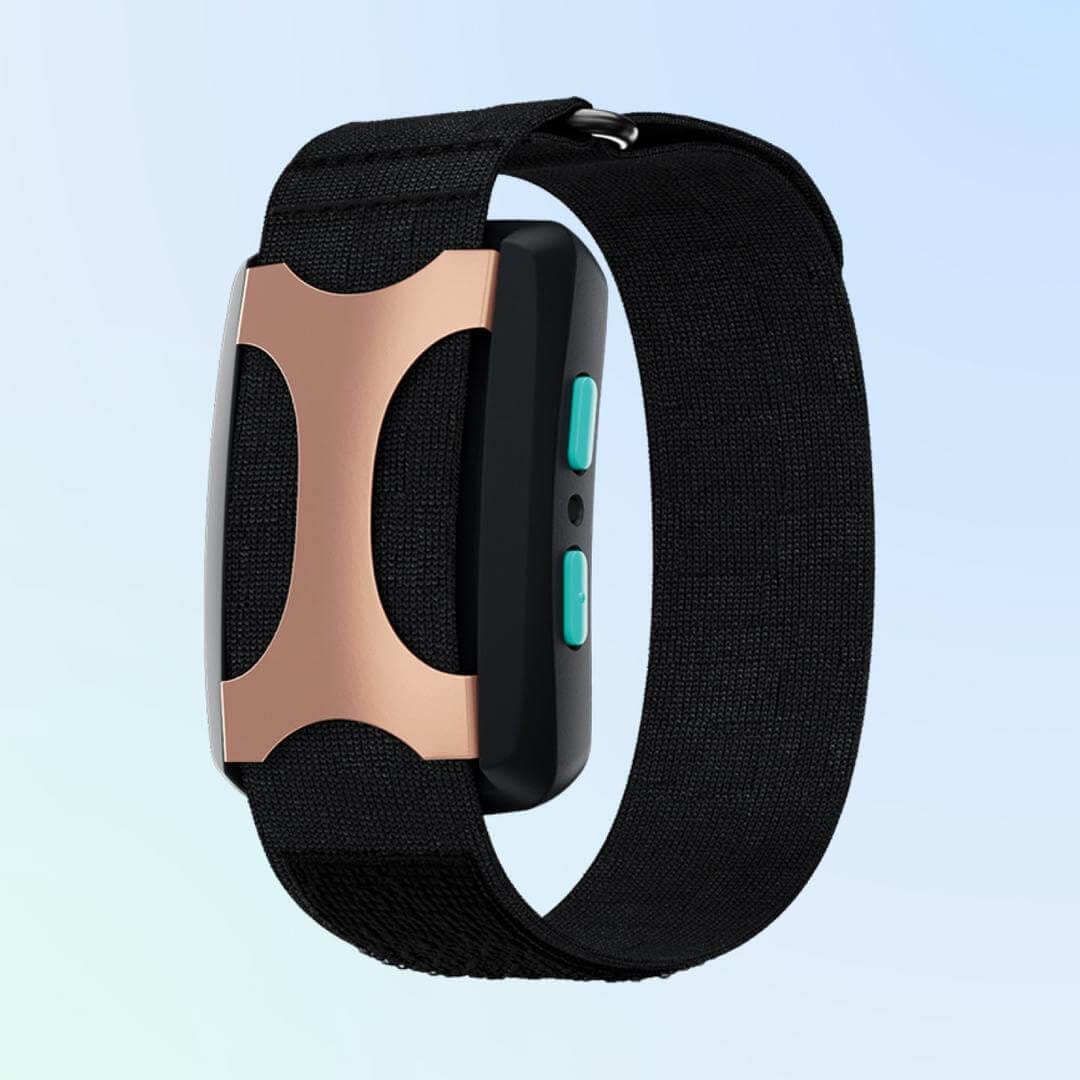
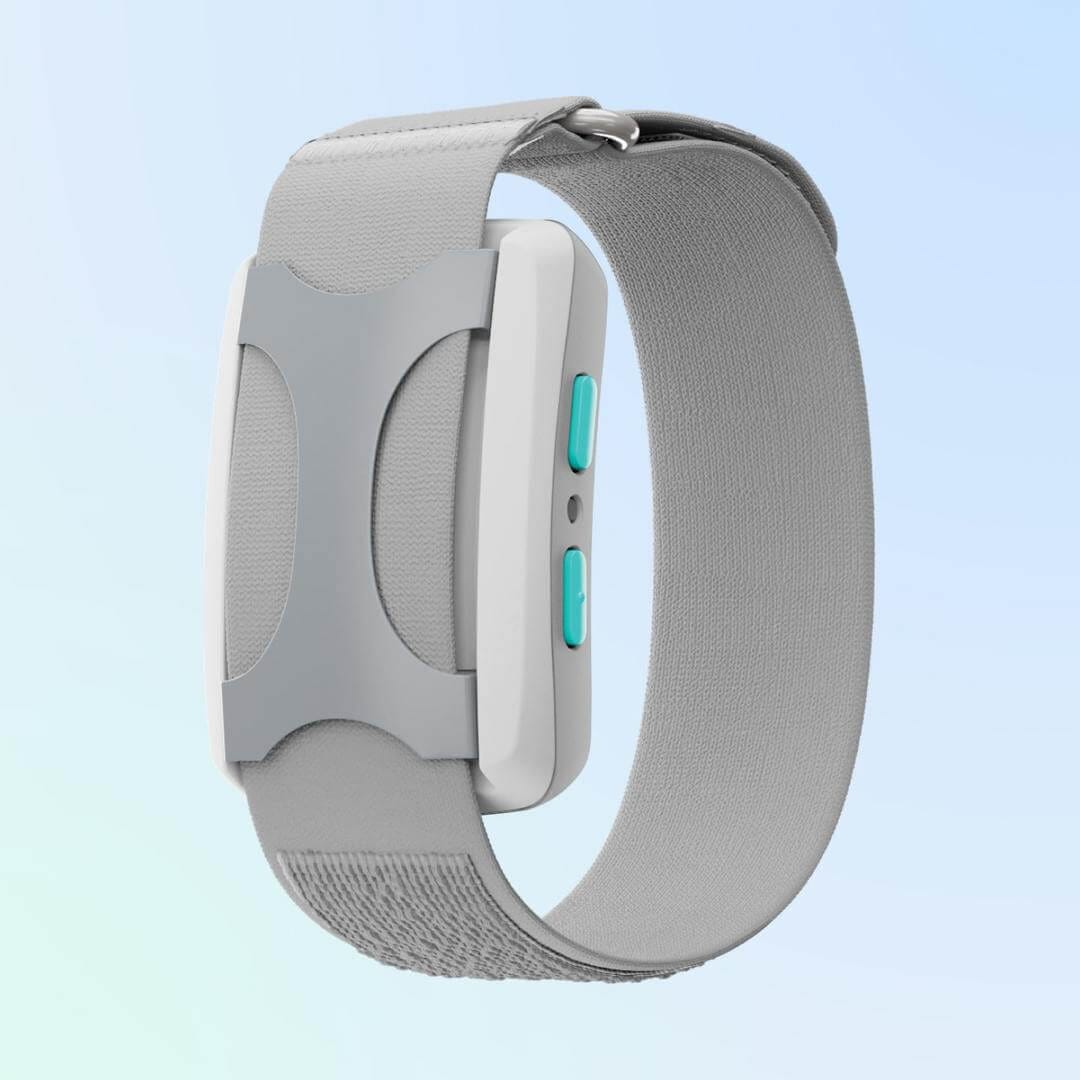
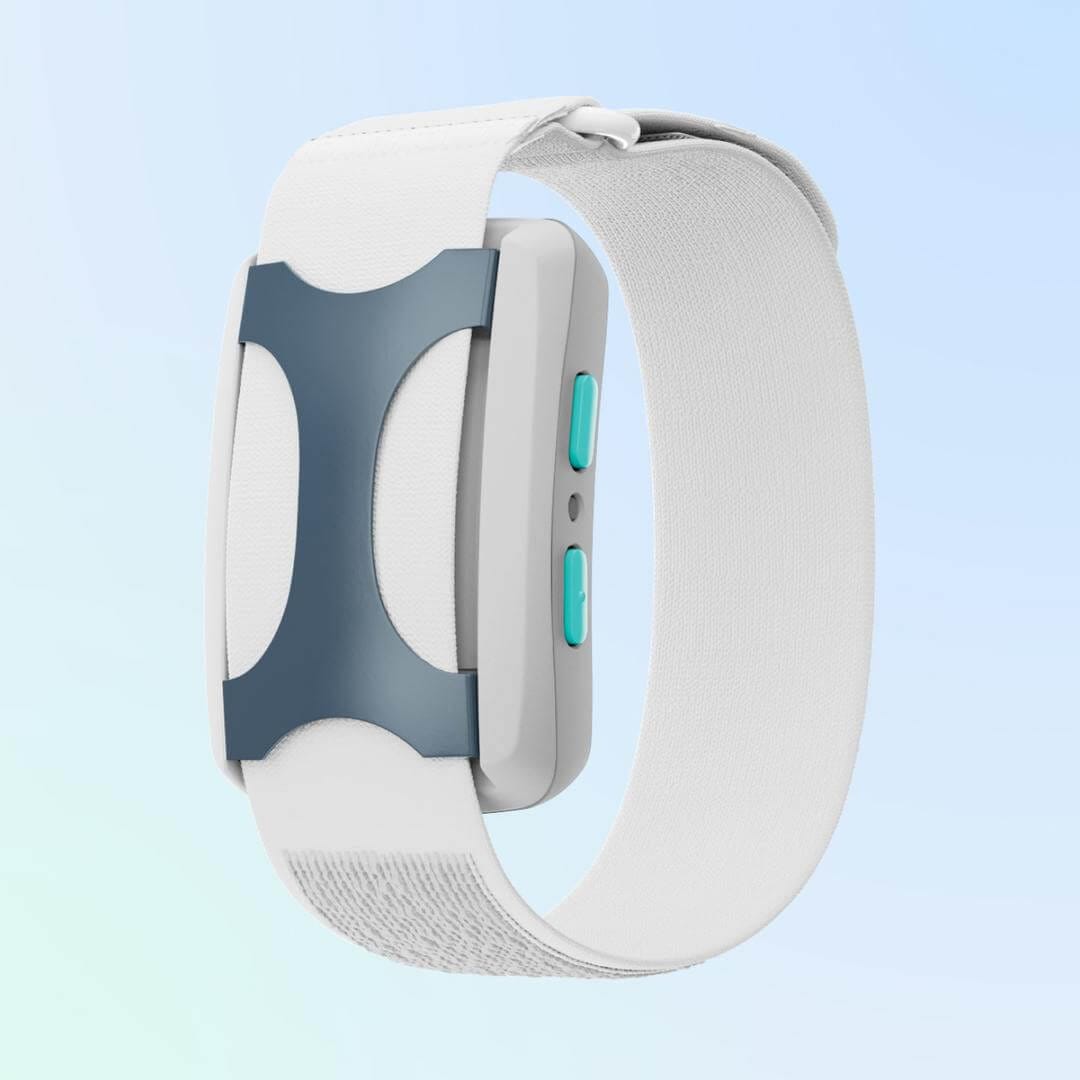
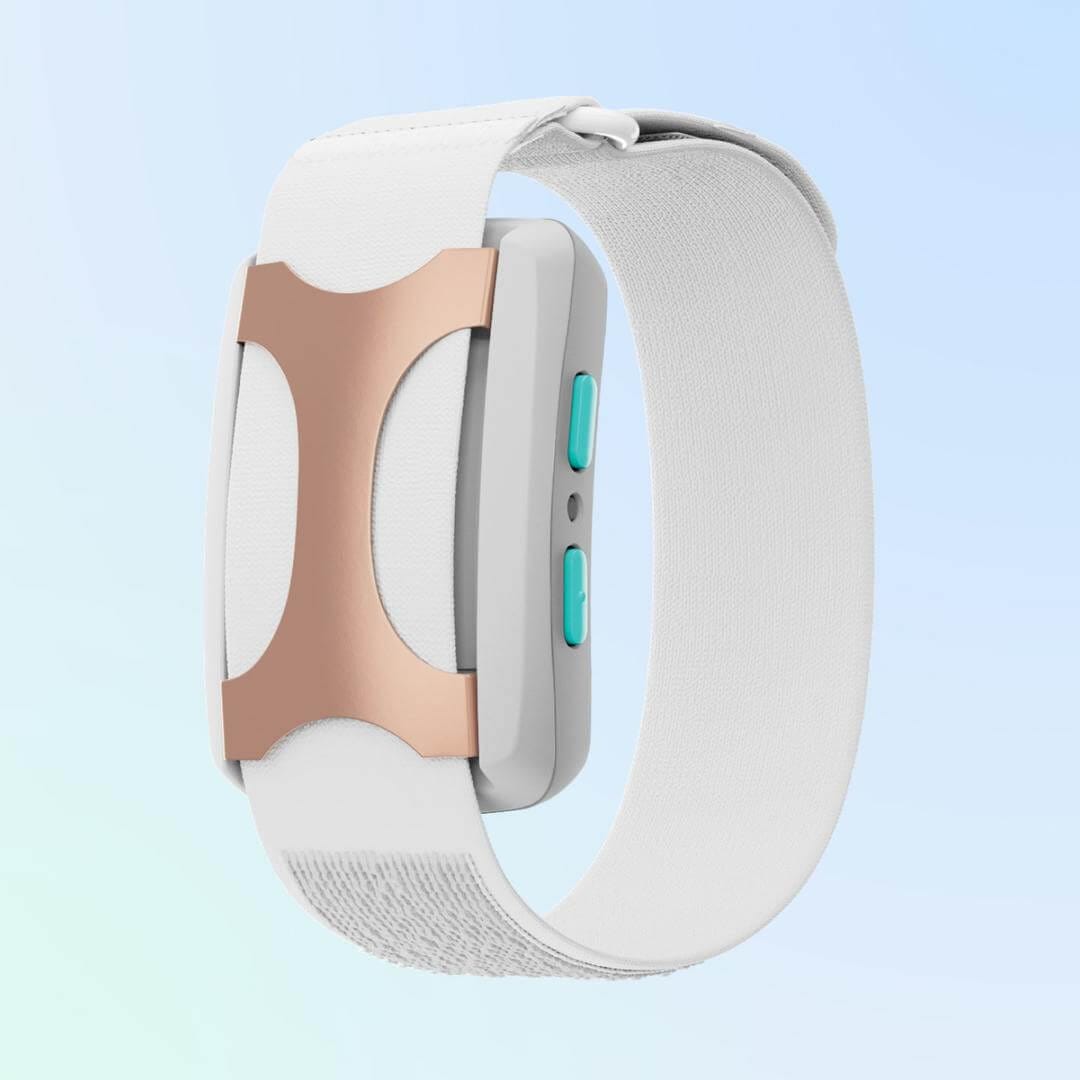
Apollo was originally available in just three dark-toned color schemes (silver, stealth and twilight). In late 2021, the company introduced three new light color schemes (glacier, marine and rose).
You can see the full collection here.
How I Use Apollo Neuro
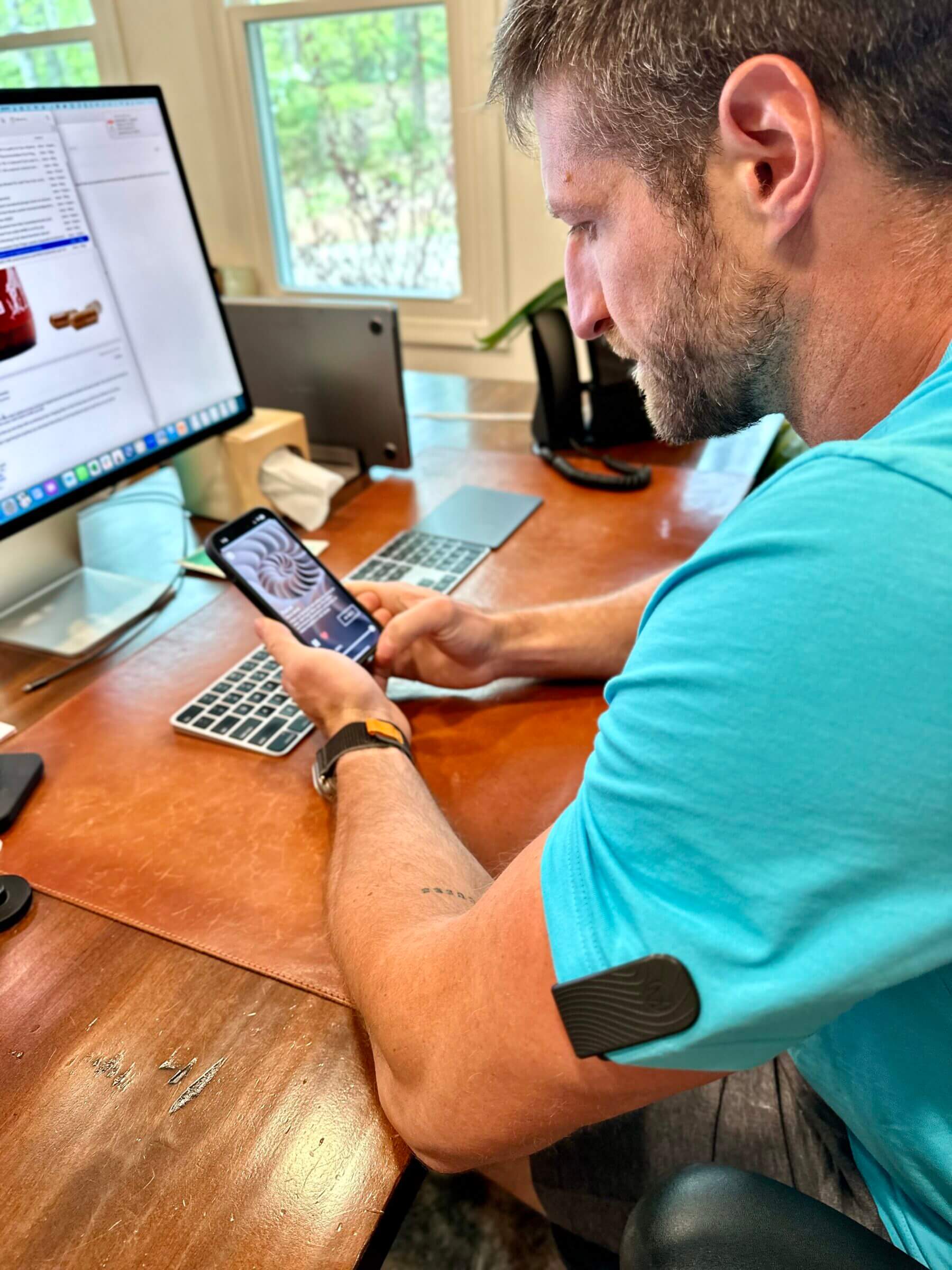
When I first heard about Apollo Neuro and its ability to improve my HRV, I got super excited because I’m also a WHOOP Strap user and HRV is a core aspect of the WHOOP platform.
WHOOP is a fitness and sleep tracker that relies heavily on HRV to calculate a daily recovery score (see my in-depth WHOOP review to learn more).
I figured I could use Apollo to improve my WHOOP recovery score. But when I started using the device, I quickly realized that Apollo is much more than a hack to score a quick win on the WHOOP platform.
In fact, once I better understood how to integrate Apollo into my routine, I began using it throughout the day, starting with the “Good Morning” program in the morning (right after getting out of bed).
I wear an Apple Watch on my left wrist and a WHOOP strap on my right wrist, so I decided to wear Apollo around my ankle by leveraging the extra strap that comes with the device. The only downside to wearing a device like Apollo on your ankle is that you look like you’re under court-ordered surveillance. Nobody has mentioned anything yet, but I noticed a few people glancing at my ankle when I’m out and about.
On most days, I do CrossFit in the morning. As soon as I return from the gym, I do a double session of the “Recovery” program, followed by a round of “Focus” in the afternoon.
As we get the kids ready for bed, I usually treat myself to a round of “Unwind,” followed by two hours of the sleep program as I turn in for the night.
After publishing this review, I loaned Apollo to my good friend Jessica, who has been trying to improve how she handles stress. This is what she had to say after using Apollo for a few days:
Hey Mike,
Apollo has been amazing! It has definitely reduced my stress and helped me get rid of a few stress headaches. I’ve also found it very helpful at night to relax and fall asleep. Highly recommend!!
Jessica M.
Busy Mom & CrossFitterA few weeks ago, both my wife and her sister got an Apollo and have been wearing it religiously every day. My sister-in-law had been suffering from chronic migraines for years before she started changing her lifestyle, including her diet, exercise and sleep. She told me the other day that Apollo has had the most noticeable impact on her migraines.
My wife and I have a fairly comparable lifestyle as far as nutrition, exercise and sleep are concerned, but her stress resilience isn’t quite as strong as mine. Every time she feels anxious or overwhelmed, she uses Apollo and feels relief within minutes. These days, she wears Apollo proactively, and that has helped her to better deal with stress and improve her stress resilience at the same time.
How I Use Apollo to Improve My Meditation Sessions
I started wearing Apollo Neuro while meditating using a brain-sensing headband called Muse S, and I’ve been getting fascinating results.
Muse S keeps tabs on my brainwaves during meditation to visualize how calm or distracted I am. Each time my mind is completely calm and free of thoughts, the Muse app shows a little bird on the meditation timeline.
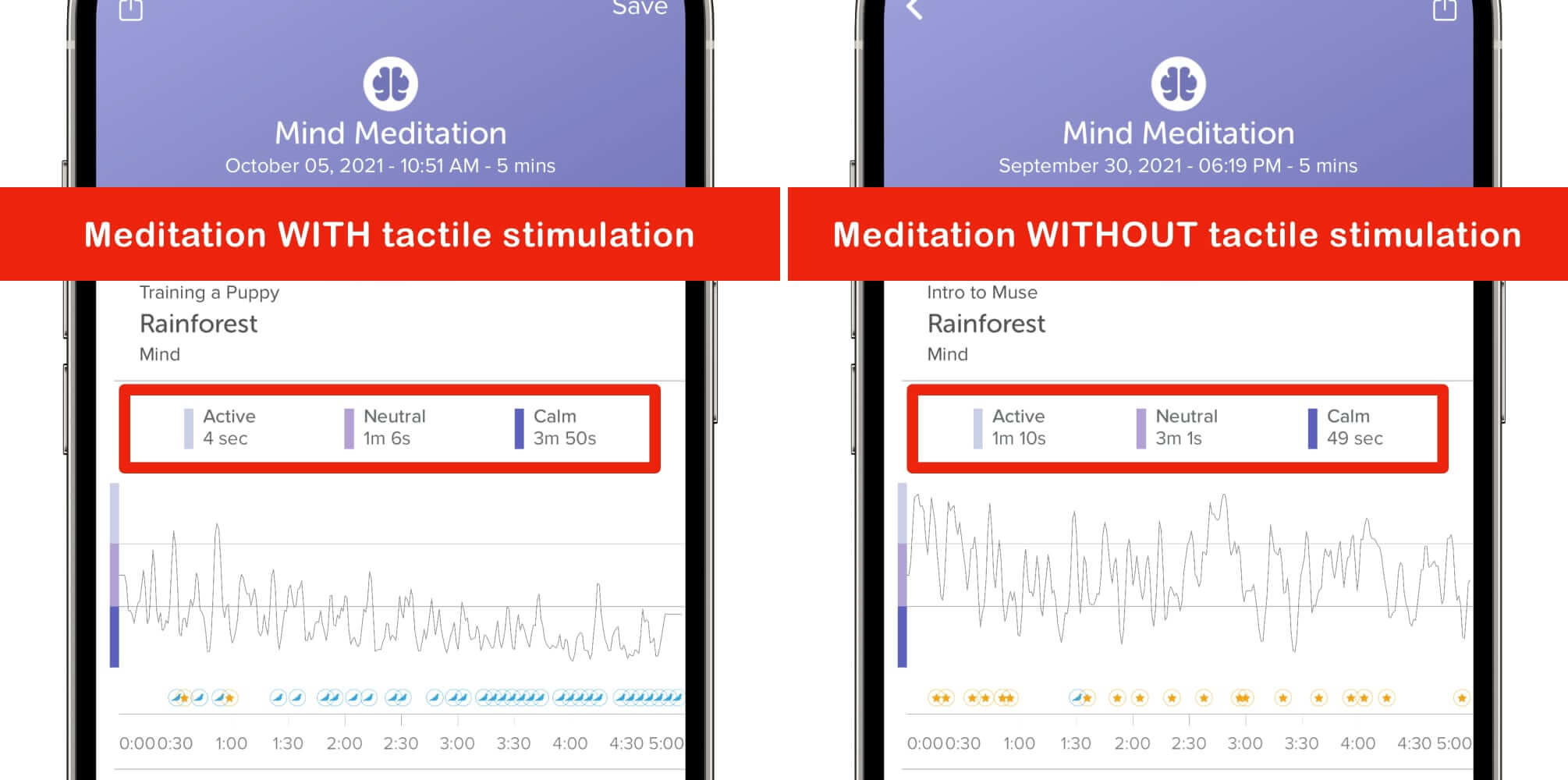
What I’ve noticed is that I stay much calmer and less distracted during my sessions when I use Apollo.
The image above is a side-by-side comparison of a session with and without using Apollo. As you can see, the differences are remarkable and serve as validation of the fact that I feel much calmer when using Apollo.
What I Have Learned While Using Apollo
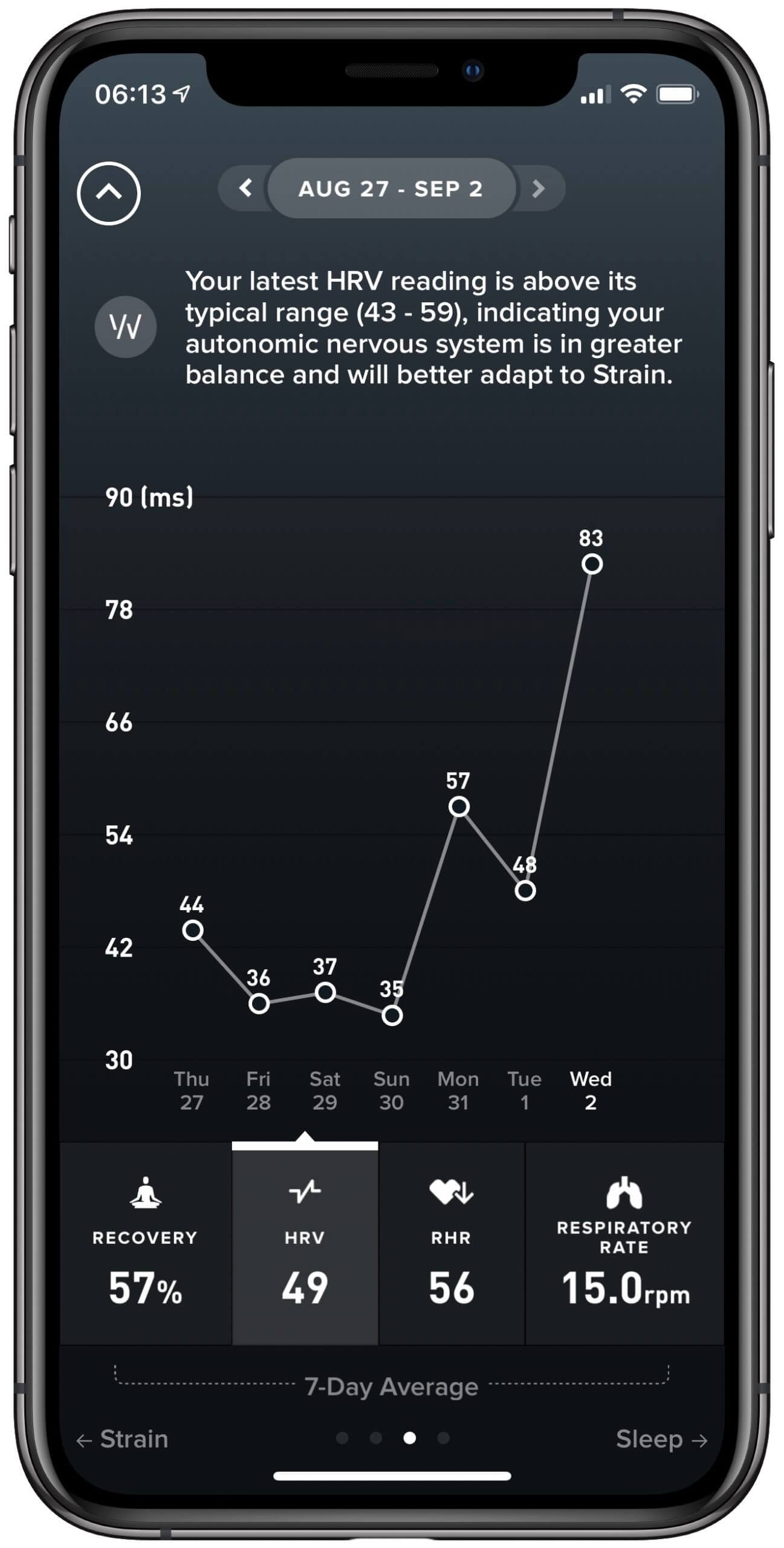
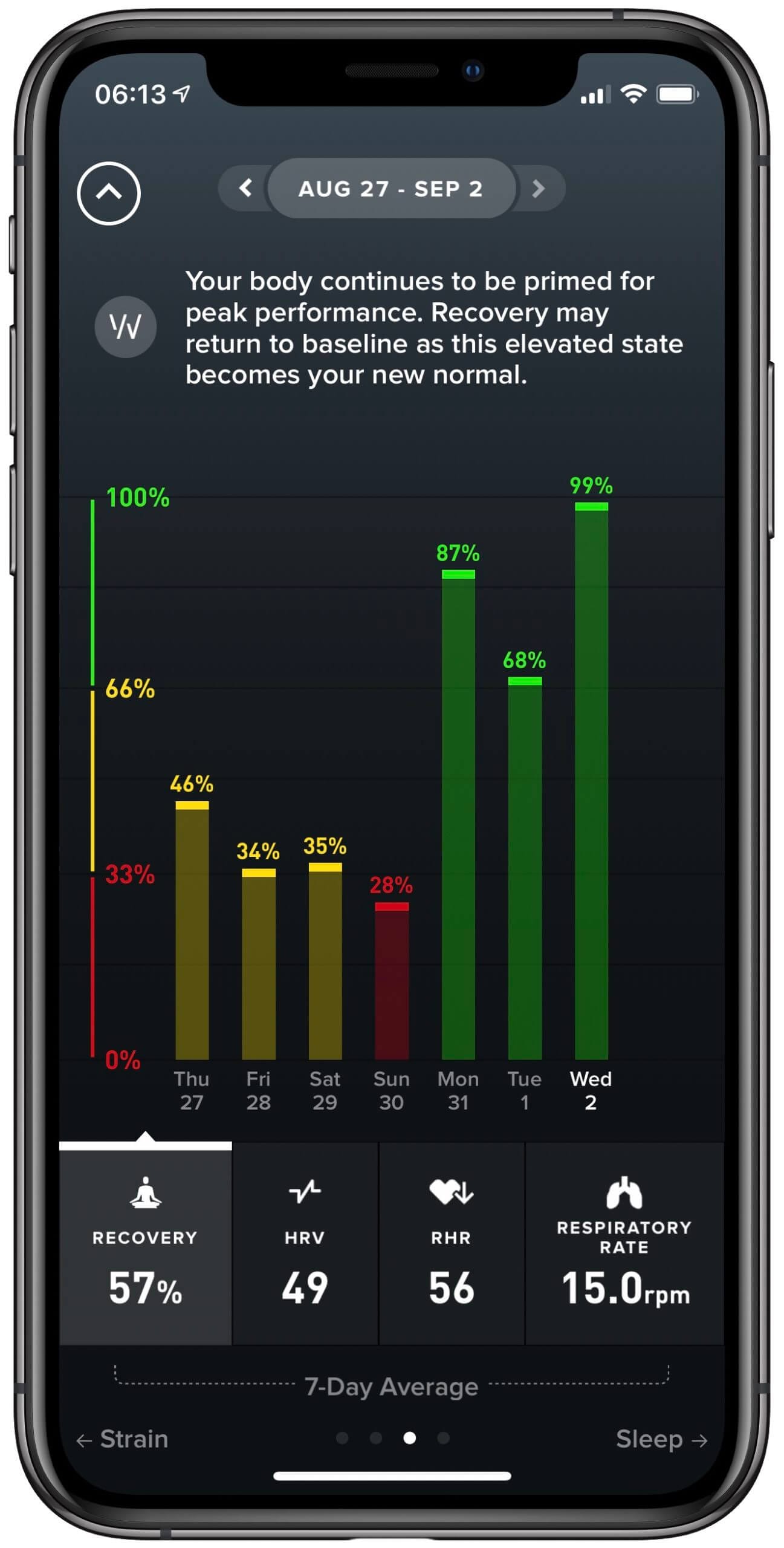
In a nutshell, wearing Apollo has made me feel better.
From a raw data perspective, I’ve tried to figure out ways that would allow me to measure the impact of Apollo on my HRV. But I ultimately decided that conducting a one-man study based on an infinite number of variables that I can’t easily control for is futile and wouldn’t result in anything other than anecdotal evidence.
So instead of making my “evidence” look more scientific than it is, I decided to just share what I’ve been feeling while using Apollo (paired with a few interesting data points). I also encourage you to check out some of the more scientific studies that others have conducted in better-controlled environments, as well as my dedicated article about whether Apollo works according to the research conducted so far.
As I mentioned earlier in this review, I feel calmer and more relaxed while wearing Apollo. I’ve also noticed that my physical recovery (as reported by WHOOP) improved after just one week of using Apollo, despite strain levels that had led to recovery scores of 30-60% in the past (before I was using the device).
Additionally, I’ve noticed an increase in deep sleep (according to WHOOP) by seven minutes, and slightly higher sleep efficiency (which has increased by 2%).
The bottom line is that based on the scientific evidence I’ve seen, as well as my personal experience with the device, I believe that Apollo is working and I’ll continue using it.
Note: A little while after writing this review, I had the chance to test TouchPoints, another wearable stress-reduction device. As was the case with Apollo, I found that the device had a positive impact on my stress perception.
Integrations
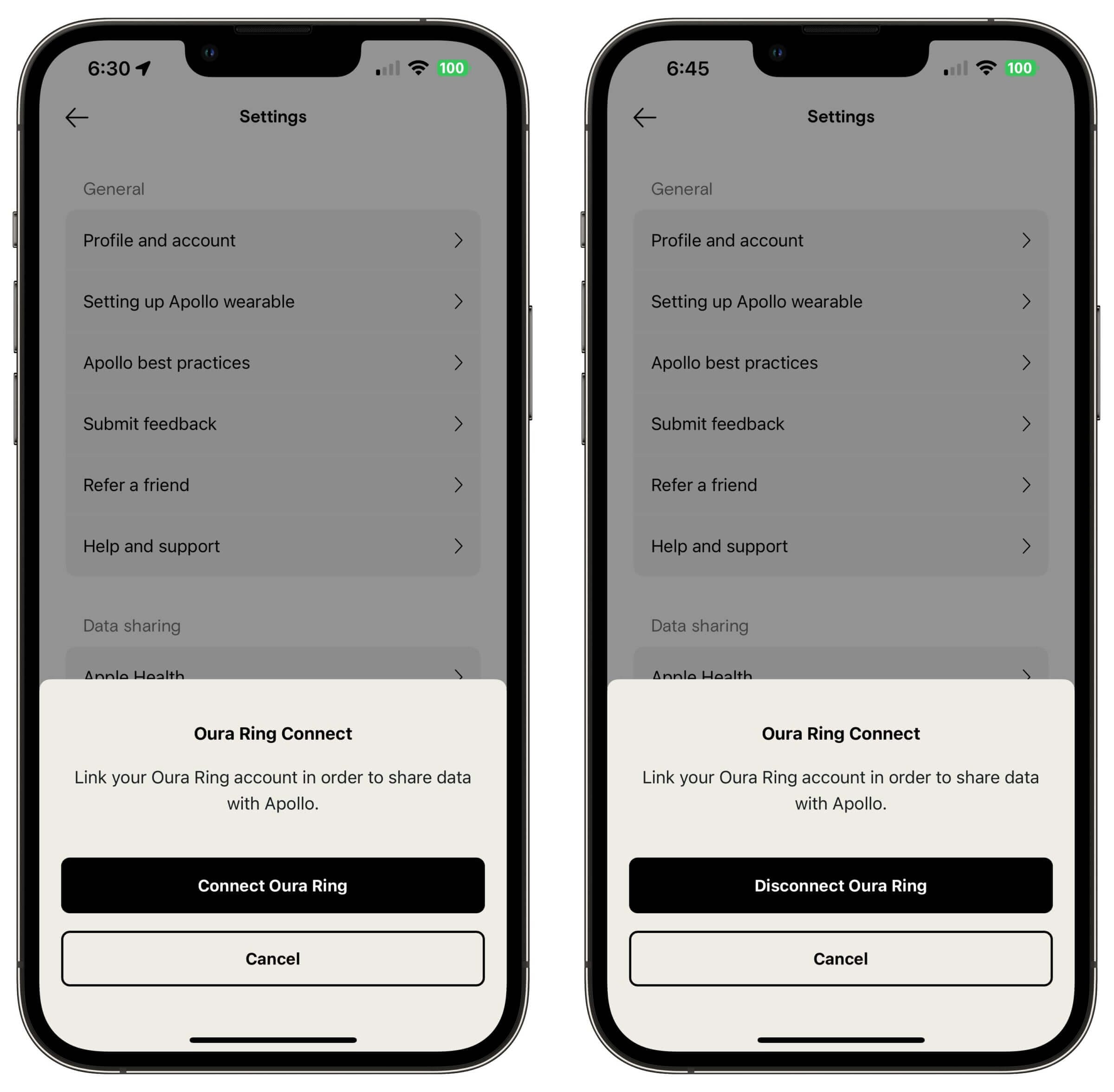
One feature of the Apollo app that I particularly appreciate is the integration with other health platforms, including Apple Health and Oura Ring.
In late 2021, Apollo introduced limited HealthKit compatibility. Apple Watch users can now link Apollo to Apple Health, so that time spent using Apollo gets logged and credited as Apple Mindful Minutes.
In addition to the WHOOP strap I mentioned above, I also have an Oura Ring to track my sleep and recovery. Apollo is currently conducting a study to research how the regular use of Apollo impacts the sleep quality of participants. By linking Apollo and Oura, you can participate in that study.
The preliminary results of a study using Oura Ring and Apollo together suggest that Apollo users see dramatic improvements in sleep quality, including:
- 19% average increase in deep sleep.
- 14% average increase in REM sleep.
- 6% average increase in total sleep time.
- 11% average increase in HRV.
- 4% average decrease in resting heart rate.
In case you’re wondering, you can disconnect your Oura Ring from the Apollo app at any time by clicking on the “Disconnect Oura Ring” button in the settings. This will stop data sharing between the two platforms.
Note: Apollo is one of the tools and strategies I’ve used to increase my HRV by 50%.
What I Would Improve
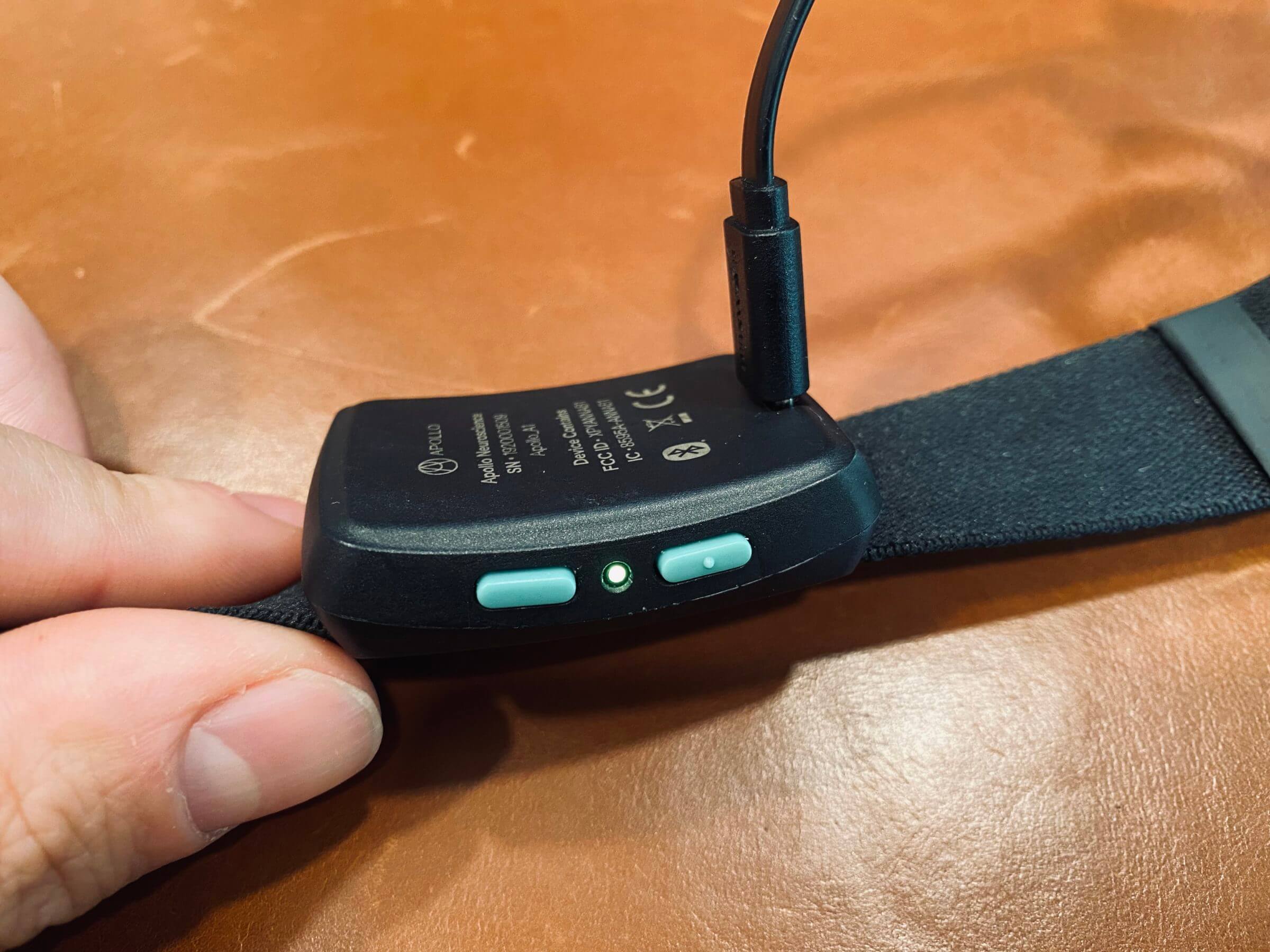
Aside from improved battery life (I have to charge the device once per day), I’d love to see integrations with additional health platforms, including WHOOP.
For example, I’d love it if WHOOP offered a journal entry that would correlate the use of Apollo with changes to HRV, RHR and sleep and recovery, depending on how much or how often I’ve used the device. That would provide incredibly useful insights and “proof” of Apollo’s impact.
Additionally, I’d love for a future hardware iteration of Apollo to include an optical HR sensor that could record changes to my HRV (as I’m using the device) in real-time. I can do that now by enabling HR broadcast in WHOOP and then using a third-party app like Elite HRV, but that’s a clunky workaround and not something I would want to do on a regular basis.
The Apollo app could also provide a simple questionnaire after each session, similar to the WHOOP Journal, that asks how I’m feeling. That way, the app could offer simple weekly or monthly reports to prove that using the device has changed how I feel.
Of course, none of that has any scientific relevance. But it would help motivate people to keep using the device and encourage them to make healthy lifestyle choices.
Is Apollo Worth it?
Apollo Neuro retails for $349, but the company offers a payment plan that can split the total amount into three, six or 12 monthly payments. The three-month plan is interest-free, but for a longer payment schedule you’ll have to pay around 10% interest.
Of course, the $349 question is whether Apollo’s technology is worth the price tag, especially considering that there are free methods that can help reduce stress, improve focus and increase your energy levels.
My take on this question is pretty simple. You should definitely exploit every method at your disposal to better manage stress, reduce your anxiety, improve the quality of your sleep and speed up mental and physical recovery. I’ve talked about many methods for doing so on this blog, including nose breathing, following a ketogenic diet, paying attention to your sleep hygiene, regular exercise and more.
However, everything else being equal, Apollo delivers better and quicker results. Plus, I haven’t met anyone who wouldn’t benefit from being calmer, more focused and better at managing stress.
So I think Apollo is worth the price tag, and I’d recommend it to friends and family. You should also consider the fact that many people find it easier to slap on a wearable and turn it on for an hour rather than taking a break to meditate during a busy day at the office.
If you’d like to give Apollo a try, you can use the discount code PRIMALSHIFT to get $60 off your order.
Frequently Asked Questions
According to the Apollo FAQ section, my own experience, and the data from some of the studies I referenced throughout the article, you can feel and measure the effects of the device within two to three minutes.
No, you don’t. While I mentioned above that you can feel the effects of Apollo while wearing it, you can also expect Apollo to work for up to two hours after using the device.
The good news is that your body does not acclimate to Apollo with use. In other words, Apollo doesn’t become less effective over time (nor does it become addictive). In fact, the company claims that “routine use of Apollo also increases the body’s sensitivity to [the device], with the result being it takes less time to feel the effect.”
Apollo has both a Bluetooth radio and an antenna. As a result, the device generates an electromagnetic field and emits electromagnetic radiation.
You can easily turn off the Bluetooth radio by switching Apollo into airplane mode. But even with Bluetooth connectivity enabled, the Bluetooth Low Energy (LE) technology used in Apollo emits only 1.9mW of power, which is far below most government-defined exposure limits.
At the same time, there’s no real consensus about what constitutes “safe” levels of EMF exposure. I’ve started taking precautions to limit my family’s EMF exposure, which you can read about in my article on how electromagnetic fields impact your health.
Apollo is only water-resistant, not waterproof. As a result, I wouldn’t wear the device in the shower or during strenuous exercise.
That’s a difficult question to answer because it depends on how long and at what intensity you use the device. The higher the intensity, the harder Apollo’s vibration motor has to work and the faster the battery runs out. The same principle applies to the run time.
I’ve noticed that when I use Apollo for two hours at night at 80% intensity, and for 15 minutes in the morning at 60% intensity, the battery drains to 85%. With additional use throughout the day, I typically end up charging Apollo (using the provided micro-USB cable) once a day.
Overall, I wish that the battery would last a bit longer so I wouldn’t have to charge Apollo so frequently.
No. Apollo is a wellness device and doesn’t require FDA approval.
Poorly managed stress and poor sleep are major contributors to weakening your immune system. If your immune system isn’t working optimally, you have a higher risk of infection — regardless of what pathogen you’re up against. So anything you can do to support your immune system might give your body a better chance at fighting an infection.
According to the company, there are no known problems concerning the use of Apollo by pregnant women. They say that there have never been adverse reactions to these frequencies documented or reported, and that they’ve had several pregnant beta testers enjoy relief from morning sickness, headaches and poor sleep.
Apollo does not currently offer integration with the Fitbit health platform (aka Google Health).
Apollo Neuro Review: Final Thoughts
Apollo is one of a small handful of fascinating stress relief gadgets that have been scientifically proven to strengthen the body’s resilience and help it better cope with stressful situations (without any side effects).
I’ve used Apollo for over 18,000 minutes as of this writing, and I like how I feel while using it.
I plan to reach out to my contacts at Apollo Neuroscience and WHOOP to see if I can get them to work on some sort of integration that could correlate how Apollo impacts my recovery and sleep and to make that correlation visible in the monthly and annual performance assessments that WHOOP provides.
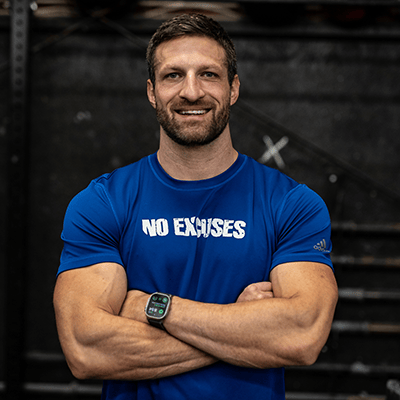
Michael Kummer is a healthy living enthusiast and CrossFit athlete whose goal is to help people achieve optimal health by bridging the gap between ancestral living and the demands of modern society.
Medical Disclaimer
The information shared on this blog is for educational purposes only, is not a substitute for the advice of medical doctors or registered dieticians (which we are not) and should not be used to prevent, diagnose, or treat any condition. Consult with a physician before starting a fitness regimen, adding supplements to your diet, or making other changes that may affect your medications, treatment plan or overall health. MichaelKummer.com and its owner MK Media Group, LLC are not liable for how you use and implement the information shared here, which is based on the opinions of the authors formed after engaging in personal use and research. We recommend products, services, or programs and are sometimes compensated for doing so as affiliates. Please read our Terms and Conditions for further information, including our privacy policy.
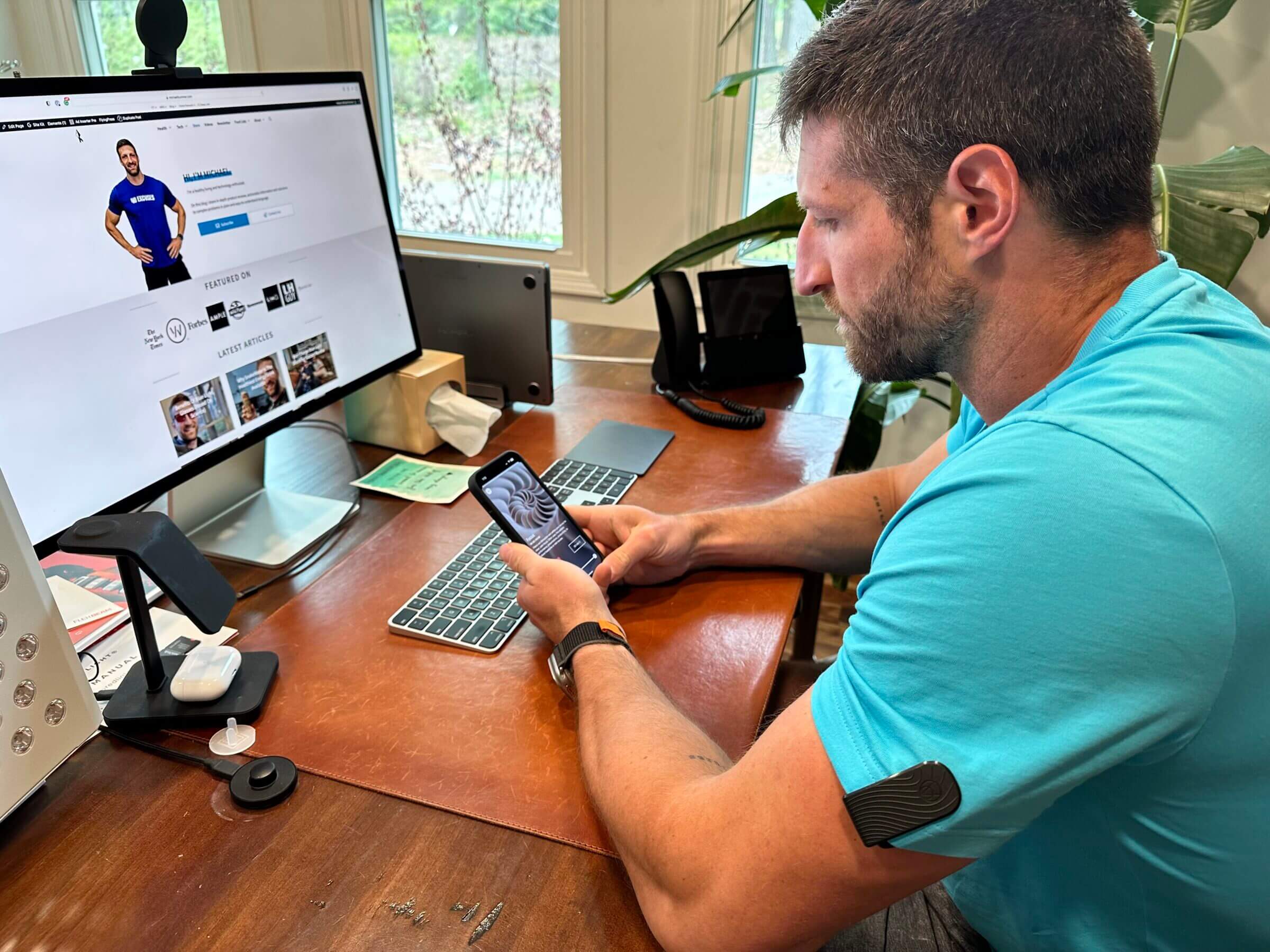
Hi,
Did you ever confirm with your contact whether Apollo is safe for pregnant women?
I am in my first trimester and am suffering from some really bad insomnia. Nothing seems to help.
Looking for some kind of relief, but don’t want to risk harming baby.
Hey Ashley,
I was told the device is safe during pregnancy but I’d recommend switching it to airplane mode to turn off the Bluetooth radio and reduce your EMF exposure.
Cheers,
Michael
I would order Whoop right this second if it linked to Apollo Neuro.
I just like to point out that there are no clinical studies let alone no strong clinical studies, that show that efficacy of this device.
The strong clinical background you reference is a list of peripherally related studies #none of which actually include the device. I realize you’re a fitness guy and not necessarily a science research guy. Thanks.
Hi JL,
all the studies listed on https://apolloneuro.com/pages/studies-roundup were clinical trials. We could certainly argue about cohort sizes but all the studies do support the efficacy of the device.
Cheers,
Michael
Hi Michael, Thanks so much for this article. I’m trying to choose between Muse and Apollo. It seems that Apollo actively helps while Muse provides feedback only? Since I know what the issue is and already have HeartWave and Fitbit for monitoring , Apollo seems like the reasonable choice. Does this make sense?
Those are two completely different devices. Muse helps you with meditation (something you’ll have to pursue actively) while Apollo is a passive device — you just have to wear it. So it depends on what it is you’re trying to accomplish.
PS: Apologies for the late reply. Your comment got accidentally deleted by my anti-spam plugin and I just found out about it.
I am on a low 2 5 my Betablocker and my HR is usually in the 40’s. How would the device work for me?
Hi Ana,
I have no hands-on experience with using Apollo while being on beta blockers. But Apollo offers a 60-day return policy, so it might be worthwhile giving it a shot.
Cheers,
Michael
That’s my question.
There are many people with a type of hypertension not related to weight, or the typical causes of high blood pressure. They have an overactive sympathetic nervous system, that can cause high blood pressure at times so, they take a Beta Blocker. You’d think the company would want to investigate if Apollo could help them, even if they are on a low 25 mg Beta Blocker.
Beta Blockers work by blocking the action of hormones like adrenaline by decreasing the activity of the heart and dampen down the body’s ‘fight-or-flight’ response.
Any idea if a new version of this device is expected anytime soon?
I have not heard of any new device being in the pipeline. But was soon as I hear something, I’ll make sure to update my article.
Hi Michael,
Have you used your EMF meter to read the Apollo? If not, do you mind getting a reading on it while it’s on (not vibrating) and while the vibrations are happening? Thank you!
Hi Lauren,
While on (not vibrating) – Weighted Magnetic: 0.5, Weighted Electric: 140, RF: 0.012.
While on (vibrating) – Weighted Magnetic: 58, Weighted Electric: 143, RF: 1.100
Cheers,
Michael
So helpful! Thank you so much!
Hi again,
Thanks so much for getting the readings on this. I’m considering purchasing an Apollo or Touchpoint. I’ve been reading more about EMFs and I have concerns about using these devices, but I also have anxiety and stress that I think these could really help with. Are you concerned at all about the level of radiation that either of these devices puts out? Thank you.
Hi Lauren,
I’m not disregarding the effects on EMFs and have written about that here: https://michaelkummer.com/how-emfs-impact-health/
However, I think in the case of Apollo, I think the pros outweigh the cons. Especially, because I’m not wearing Apollo all day. So my exposure is limited.
Cheers,
Michael
Great. That’s understandable! Thanks!
Hi! I am interested in this device but have a question. I am currently on beta-blocker therapy for anxiety and an overall high heart rate and panic attacks. Is this device appropriate for someone with my conditions? Thank you!
Hi Clint,
I don’t see why your condition would be an issue when using Apollo. Apollo targets your autonomic nervous system which should help with relaxation and slowing down your heart rate.
Cheers,
Michael
Hi Michael,
Any idea if a clinician can purchase one of these, and have their clients use it during their sessions?
i..e is the app set to one person? I would think not? As it’s mere stimulation and doesn’t track or measure anything.
Other than hygiene I see no issues with this.
What are your thoughts?
Also, I’ve used WHOOP since NOv 2019 so keen to see how it affects my stats!!
Hi Rob!
I don’t see why that shouldn’t work. The app isn’t really personalized and records only how much time you have spent with each of the programs.
Cheers,
Michael
I just ordered Apollo and am very excited! Would it be useful to use it in conjunction with something like Lief Therapeutics, or would Lief replace it? I want the detailed tracking that Lief provides, but need something that helps in real time, not just with changed behavior. I’m not an athlete so I’m not sure how helpful something like WHOOP would be.
Hi Claire,
I think both Apollo and Lief do the same thing as far as modulating HRV and relieving stress are concerned. I don’t know what detailed tracking Lief provides but tracking HRV in real-time is almost useless because it fluctuates so much. That’s why WHOOP tracks it only during deep sleep. So I’d probably go with Apollo + WHOOP if you want to better understand the impact of stress-relieving devices on your HRV and recovery.
Cheers,
Michael
Thank you for replying so quickly!
Is the Apollo safe to use for pregnant women?
Hi Em,
I believe it is but I reached out to my contact at Apollo to confirm.
Cheers,
Michael
@Is it safe for someone who has AFIB or other heart issues?
Hi Colleen,
yes, I don’t see why Apollo would cause a problem for someone with a heart condition.
Cheers,
Michael
I’d love to see a comparison of Apollo and Touchpoints, or at least a review of Touchpoints. I can’t find any comparison online and am trying to make a decision.
Hi Ellie,
I had never heard about Touchpoints before but I’ll reach out to them and see if they’d like to work with me on a review. From what I can tell, both Apollo and Touchpoints appear to be using the very same methodology (vibrations) to reduce stress.
Wonderful! Thank you. I’ve just discovered yet another wearable doing the same thing: [Feelcove link removed by the MK editorial team because it was broken].
Maybe you could evaluate all of them. I can’t decide which one to buy for my daughter and need help. Yours would be much appreciated.
I’ll check it out but as of right now, I can tell you that Apollo works 100% :) So I’d go with Apollo, unless the other options are significantly less expensive.
It looks as though the Touchpoints options is $189 and they claim to have scientific data as well… Definitely interested in your perspective if possible at some point given the significant difference in price!
Just a quick editorial comment – you borrow FROM someone, you loan TO them. You didn’t borrow the device to your friend. You loaned it to her. She borrowed it from you. Thanks for the review. I think we’re going to give it a try to help my husband’s severe sleep issues.
Thanks Kathy! I might have added that note after my editor proof-read the article without having him double-check my additions :)
Can children as young as 10 Wear the device? My son suffers general anxiety and is also ASD.
As far as I know, Apollo is perfectly safe for kids.
I purchased this device and it stopped working less than six weeks in. It never did anything for me anyway. I consider it an expensive mistake and would urge anyone considering it to think twice. At the very least, be sure to test it right away for quick return if it does not work for you.
I’m sorry to hear that Ken. I’ve had my Apollo for several months and it’s still working fine. Have you reached out to Apollo support to see what the issue could be?
I am very interested in trying this because I’ve struggled with sleep for about a year now. I wake up between 3-5 am often and it usually takes an hour or more to get back to sleep. Do you think it will really help with this?
Thanks,
Ali
Hi Alison1
Without knowing the exact reasons for your sleep issues, it’s tough to know for sure but I’d definitely give Apollo a try.
I also encourage you to check out some of my other content related to improving sleep – see https://michaelkummer.com/tag/sleep/
Maybe you’re too hot (or cold) in the second half of your night and a temperature-controlled mattress might help.
Cheers,
Michael
I just got my WHOOP yesterday (based partly on your recommendations, thanks!), and now I want one of these, too. Since recovery from adrenal insufficiency is my main goal, and I could use some help with focus during the day, this seems like a great solution for me. It’s a bit pricey though, so I might wait until early 2021. If I do get one, I hope to come back here for the 15% discount, thanks!
PS – LOL re the ankle strap. I was thinking I would probably want to wear mine on my ankle as well, and wondered if it would look like an ankle monitor, haha!
I have had my Apollo a couple of months now. My sleep has been not great the last few weeks (difficulty going to sleep and horrible nightmares) but I haven’t worn Apollo when I sleep. I tried and it’s the only one time the vibrations annoyed me. Is there a way to overcome this? Have you heard this from any other users? I am open to suggestions because I would like to have uninterrupted quality sleep.
Hi MJK,
I have found the vibrations mildly irritating in the beginning too but after a few nights, I didn’t even feel them anymore. So I suggest you keep using it as you’ll likely get used to them.
Cheers,
Michael
I have difficult sleeping and sometimes I wake up with a rapid heart rate, anywhere from 95 – 140 BPM and it can last for several hours. Will Apollo help reduce my heart rate so I can get back to sleep
Hi Nicholas,
Apollo can certainly help reduce an elevated HR, in particular if it’s stress-induced.
The question is why does your HR spike and if there is an underlying medical condition. If I were you, I’d talk to a doctor and, if need be, go to a sleep lab.
That might not be the answer you were hoping for but I always encourage people to identify the root cause of an issue, instead of trying to mask the symptoms.
Cheers,
Michael
Does the Apollo require a monthly app subscription?
Hi Shari,
Nope, you’ll only pay for the device.
Cheers,
Michael
I am buying either this Apollo or else Whoop for my 15-year old grandson. He is very athletic but often gets headaches, and he’s trying to find out if it’s poor sleep quality or stress. Which one would you recommend if ai can only buy one? (I will purchase Whoop w. a subscription, of course.)
Thanks very much for your help.
Hi HGL,
That’s a great question! WHOOP might be able to help your grandson identify what the issue is and Apollo might be able to mitigate the symptoms. I would probably go with Apollo but also work on improving his sleep hygiene and diet. I used to have headaches when I was a kid and I’d say they were likely caused by eating too much processed food and, in particular, carbs.
Check out the following blog posts that should help with sleep and diet:
https://michaelkummer.com/sleep-guide/
https://michaelkummer.com/cant-fall-asleep/
https://michaelkummer.com/keto-paleo-guide/
Cheers,
Michael
I have afib heart will this hurt me
My girlfriend got one and because I have a n AFib heart I need to know if this going to hurt me.
I don’t think it would hurt you but I’d check with your doctor.
that link that supposed to give 15% off don’t do anything. still show up as 349
Hi Dmitry!
I apologize for the inconvenience! Apollo recently moved to a new affiliate platform and it looks like the discount didn’t transfer over. I’ve sent an email to my contact at Apollo to fix the problem.
Thanks,
Michael
The link is fixed now and the discount should get applied automatically! Sorry for the inconvenience!
Thanks for a real life and thoughtful review. I have had Apollo now for 8 days and was partly skeptical, I mean how I know it’s not placebo effect etc. Here is where it’s a noticeable improvement. Sleep. I tend to sleep in shifts, wake up at 3-ish, then not fall back for 30-40 min. A few days of Apollo and I have slept through the night. I skipped a night 2 days ago and when I awoke in the middle, I went and strapped it on and fell back to sleep quite quickly. After reading your review, I feel that someone else is seeing results and that’s encouraging. thank you!
Thanks for the feedback AJ, I’m glad Apollo is working for you as well!
The comment on the ankle mounting made me smile.. It was the first thing I thought when you said it could be ankle mounted! Its exactly where I would put it, as I wear my apple watch on my wrist. Does the app write HRV into apple health?